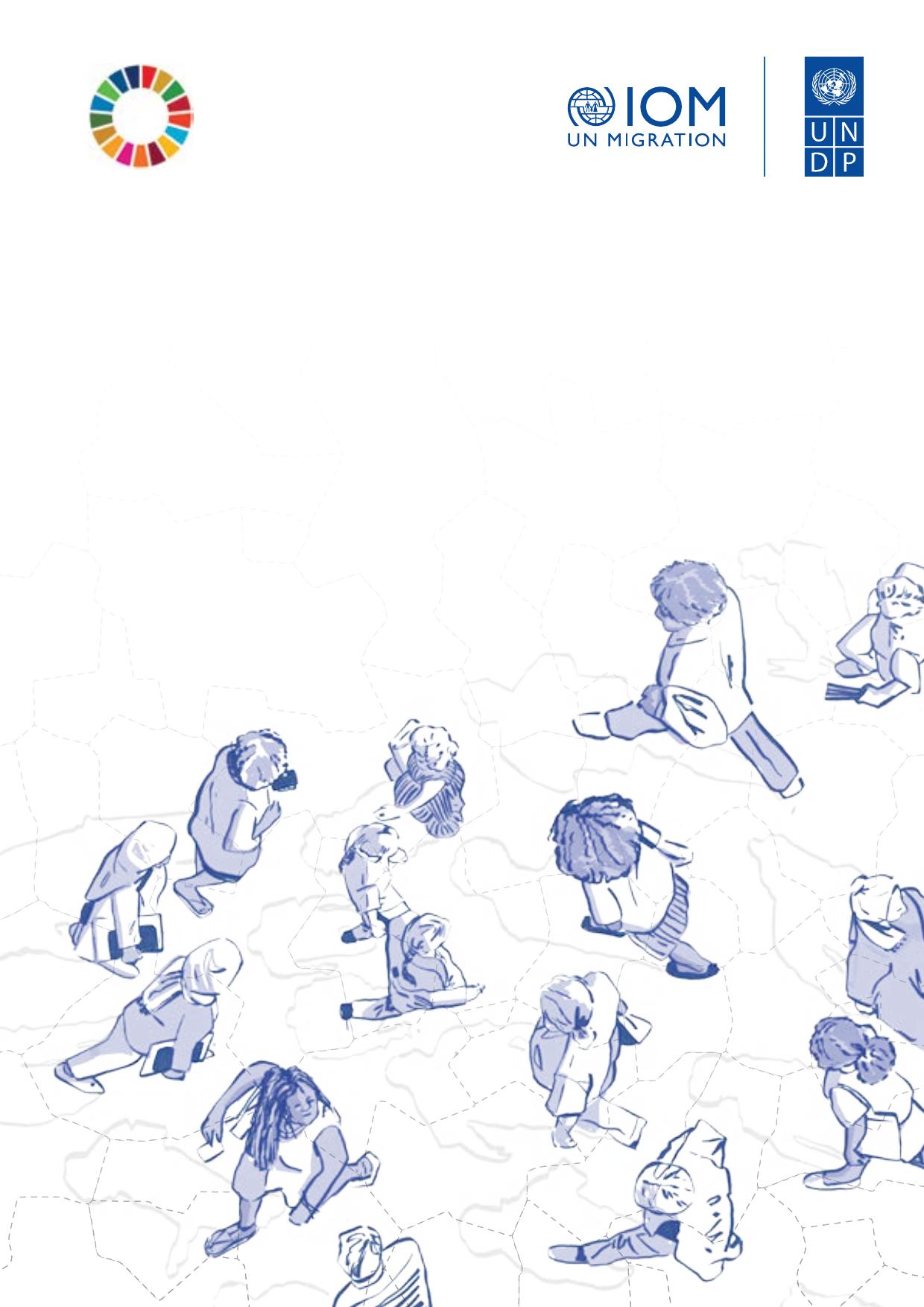EMPOWERINGMIGRANTSANDCOMMUNITIES:PrivateSectorEngagementforInclusiveSustainableDevelopmentOctober2023Theopinionsexpressedinthereportarethoseoftheauthorsanddonotnecessarilyre-flecttheviewsoftheInternationalOrganizationforMigration(IOM)oroftheUnitedNationsDevelopmentProgramme(UNDP).ThedesignationsemployedandthepresentationofmaterialthroughoutthereportdonotimplytheexpressionofanyopinionwhatsoeveronthepartofIOMorUNDPconcerningthelegalstatusofanycountry,territory,cityorarea,orofitsauthorities,orconcerningitsfrontiersorboundaries.IOMiscommittedtotheprinciplethathumaneandorderlymigrationbenefitsmigrantsandsociety.Asanintergovernmentalorganization,IOMactswithitspartnersintheinter-nationalcommunityto:assistinmeetingtheoperationalchallengesofmigration;advanceunderstandingofmigrationissues;encouragesocialandeconomicdevelopmentthroughmigration;andupholdthehumandignityandwell-beingofmigrants.ThispublicationwasissuedwithoutformaleditingbyIOM.ThispublicationwasissuedwithoutIOMPublicationsUnit(PUB)approvalforadherencetoIOM’sbrandandstylestandards.ThispublicationwasissuedwithoutIOMResearchUnit(RES)endorsement.UNDPistheleadingUnitedNationsorganizationfightingtoendtheinjusticeofpoverty,inequalityandclimatechange.Workingwithourbroadnetworkofexpertsandpartnersin170countries,wehelpnationstobuildintegrated,lastingsolutionsforpeopleandplanet.Learnmoreatundp.orgorfollowusat@UNDP._____________________________©IOMandUNDP2023Allrightsreserved.Nopartofthispublicationmaybereproduced,storedinaretrievalsystem,ortransmittedinanyformorbyanymeans,electronic,mechanical,photocopying,recording,orotherwisewithoutthepriorwrittenpermissionofthepublisher.2AcknowledgementsThispublicationwasproducedwithintheframeworkoftheIOM-UNDPJointGlobalPro-gramme‘MakingMigrationWorkforSustainableDevelopment’(M4SD),withfinancialsup-portfromtheSwissAgencyforDevelopmentandCooperation(SDC).ItwaspreparedbytheUnitedNationsDevelopmentProgramme(UNDP)CrisisBureau,RecoverySolutionsandHumanMobilityTeam.ThedraftingwasledbyCharlotteMüller,MigrationandPrivateSectorAnalyst,undertheguidanceofDavidKhoudour,GlobalAdvis-er–HumanMobility,andJohannesTarvainen,MigrationandDisplacementSpecialist,withsupportfromAngieMontenegro,Jean-EdwidgePetit-FrèreandLeonieRauls.TheelaborationofthepublicationinvolvedaconsultationprocesswithinUNDP,includingwithdesignatedfocalpointsinallprogrammecountries,regionalhubs,theCrisisBureauRecoverySolutionsandHumanMobilityTeaminNewYork,andalsoinvolvedcontributionsfromtheInternationalOrganizationforMigration(IOM)countryoffices,IOMthematicex-perts,theM4SDProgrammeManagementUnitandtheInternationalOrganisationofEm-ployers(IOE).Invaluableinputswerereceivedfromthefollowingcolleagues:IOE:MirelaStoia,StéphanieWinetIOM:MariaAlexandraBassermann,KillianClifford,AdrianaGarces,PhilipHunter,AudreyHickcox,JoanneIrvine,JoséFabioJimenez,LarisaLara,JuliaMelnichouk,ShahreenMunir,MonikaPetrovic,MamunurMd.Rashid,PrajwalSharma,AndrésTapia,UNDP:HalaAbedrahboh,ZinaidaAdam,CristinaBurgos,AwaCiss,PatriciaDelaCruz,BabacarFaye,ErickHernandez,YukoHirose,SelmaCheikhMalainin,NapoleonManeg-deg,JamaroMarville,SerigneMbacke,DanielaParedes,MonikaPeruffo,CatherineOs-born,PatrickNicholson,CarloRuiz,JohannaSaenz,MartinaSalini,SafaSamid,AnnabellaSkof,CamilleSoriano,LanaStade,XinTong,ApurbaSwateeandYuxuanWen.31.TABLEOFCONTENTSExecutiveSummary51.Introduction81.1.Keyterms101.2.Background131.3.Approachandstructure152.Howtobuildevidence-informedstrategiesforprivatesectorengagement?162.1.Studyfocusandkeyelementsoftheprivatesectormapping162.2.Datasourcesandmethods222.3.Keyrecommendationsforaction293.Howtocontinueadvocacywiththeprivatesector?303.1.Whyprivatesectorengagementcontinuestomatter313.2.Examplesofaction373.3.Keyrecommendationsforaction424.Howtoengagetheprivatesectormoreefficiently?454.1.Modalitiesforincreasedengagement454.2.Challengesandkeyactions524.3.Keyrecommendationsforaction645.References654EXECUTIVESUMMARYEmpoweringMigrantsandCommunities:PrivateSectorEngagementforInclusiveSus-tainableDevelopmentoffersaroadmaptogovernmentsandotherstakeholdersonscal-inguptheparticipationoftheprivatesectorindeliveringthedevelopmentbenefitsofmigration.ThereportdrawsontheexperiencesoftheInternationalOrganizationforMigra-tion(IOM)andtheUnitedNationsDevelopmentProgramme(UNDP),andbuildson‘MakingMigrationWorkforSustainableDevelopment’(M4SD),ajointglobalprogrammesupportedbytheSwissAgencyforDevelopmentandCooperation(SDC).Migrationisusuallyatriple-winsituationformigrantsthemselvesaswellastheircoun-triesoforiginanddestination.Yet,aseriesofchallenges,includinglimitedaccessformigrantstotheformallabourmarket,butalsotofinance,healthcareandeducation,combinedwithdifficultiesinhavingtheirskillsordiplomasrecognized,andincreasingxenophobia,racismanddiscrimination,tendtolimitthebenefitsofhumanmobilityforsustainabledevelopment.Asamajordriverofjobcreationandeconomicgrowth,theprivatesectorcanhelpovercometheseobstaclesbycreatingemploymentopportuni-tiesformigrantsandothercommunities,supportingentrepreneurship,improvingaccesstoproductsandservices,andadvocatingformigrants’socioeconomicintegration.Thisisparticularlyimportantforlessdevelopedregions.However,turbulentglobalheadwindsandacountry’soveralleconomicandsocialcondi-tions,aswellasitslegal,regulatoryandpolicyframeworks,significantlyaffectthefeasibilityofinvolvingtheprivatesector.Withintheprivatesectoritself,limitedcapabilities,abiasornegativeattitudestowardsmigrants,considerationoftradeunionsandgender-baseddis-criminationraisefurtherbarriers.Allofthisoccurswithinacontextwherethegovernmentsthatcouldplayapivotalroleinpromotingmorerobustprivatesectorengagementoftenlackthenecessarycapacitiesandincentivestodoso.Theneedtoexpandprivatesectorengagementforenhancedmigrationandsustainabledevelopmentoutcomesisveryclear.Governmentsandinternationalcooperationshouldfocusonevidence-informed,participatoryandlong-termmulti-stakeholdersolutions.OperatinginBangladesh,Ecuador,Jamaica,Kyrgyzstan,Moldova,Morocco,Nepal,thePhilippines,Senegal,SerbiaandTunisia,theM4SDProgrammeutilizedmappingoftheprivatesector;advocacytoovercomehostility,reluctanceordisinterest;capacitydevel-opmentandtechnicalassistance;conveningandknowledge-sharing;andservicedeliveryandcollaboration.ThemappingscarriedoutwithintheframeworkonthisglobalProgrammehelpedidentifyprivatesectorprioritiesandrelevantactorscurrentlyparticipatinginmigrationandsustain-abledevelopmentinitiatives,aswellasthosetobeengaged.InNepalforinstance,theprivatesectormappingfocusedonreturningfemalemigrantworkers,themajorityofwhomtakeupemploymentintheinformaleconomy.Themappingshowedtheneedtoaddressgenderequalityandsocialinclusioninbusiness.InSenegal,themappingshowedhowhighunemploymentdrivesyoungpeopletoemigratetoEurope,mostlyusingirregular5routes,andidentifiedmeasureswiththeprivatesectortocreateneweconomicopportuni-tiesathomeforpotentialemigrantsandreturnmigrants.InEcuador,mappingsshowedthatindifferenceanduncertaintytowardsmigrationtopicsprevailintheprivatesector.Manyperceptionsofmigrantsarerootedinfalsenarrativesandmisinformationandareoftenfuelledbyxenophobiaandracism.Bymakingthepartsoftheprivatesectorwhoareskeptical,disinterestedorunwillingtobeinvolvedawareofthebenefitsthatmigrationcanbringfortheirbusinesses,positivechangescanbeachieved.PartnersinEcuadorcarriedoutseveralactivitiestofacilitategreaterunderstandingbytheprivatesectoronthecontributionsthatmigrantscanbringtotheirbusinesses,namelytrain-ingsoninclusivehiringpracticesfortheprivatesectorandonCVwritingforcommunitymembers,includingmigrants,andthecreationofmunicipaljobbanks.Tosupportgovernmentsinenhancingprivatesectorengagement,theM4SDProgrammeprovidedtechnicalsupporttostrengthenlocalornationalcapacitiestoworkmorecloselywiththeprivatesector.InSerbia,theprivatesectormappinghighlightedopportunitiesforcooperationamongSerbianbusinessesandthediaspora.TheM4SDProgrammesupport-edtheBusinessCouncilforDiasporaoftheChamberofCommerceandIndustryinSerbia(CCIS)indevelopinganew,results-basedstrategy,providingaclearactionplantoharnessthepotentialofthediaspora,whilepromotingeconomicgrowthandcollaboration.Knowledge-sharingservestobetterunderstandandmutualizewhatworksandwhatdoesnotworktoimproveprivatesectorengagement,partnershipsandprogramminginissuesrelatedtomigration,includingidentifyingandscalinguppotentialareasforcollaborationandfutureconcretenextsteps.Toenhancethewell-beingofcommunitymembers,includingmigrants,governmentsshouldworkwiththeprivatesectoronprovidingaccesstodecentjobs.InBangladesh,theNa-tionalIntelligenceforSkills,Education,EmploymentandEntrepreneurship(NISE)platformaimstobridgethegapbetweenthedemandandsupplysidesbymatchmakingamongthegovernment,publicandprivateskillsserviceproviders,employersandyouth.Tocreateanenablingenvironmentforprivatesectorengagement,governmentsshouldaddresspolicyandregulatorybarriersthatrestricttherightsofmigrants,especiallywom-enandyouth,andinhibittheiraccesstoemployment,education,health,socialprotec-tion,amongothers.TheM4SDProgrammehassupportedlocalandnationalauthoritiesincomprehensivelymainstreamingmigrationconsiderationsindevelopmentpoliciesandplanning.Forinstance,theM4SDProgrammeprovidedtechnicalassistanceindraftingtheNationalDiasporaPolicyinJamaica.6Keyrecommendationsforgovernmentsanddevelopmentactors>UseprivatesectormappingssuchasthosedevelopedintheM4SDProgrammetobuildevidence-informedstrategies,enhancedbycollaboratingwiththeprivatesector.>Advocatewiththeprivatesectortoraiseawarenessofthebenefitsthatmigrationcanbringfortheirbusinesses.>SupportthecreationofPublic-PrivatePartnerships(PPPs)andpromoteprivatesector-drivenknowledgeexchangeattheglobal,regional,nationalandlocallevels.>Increaseaccesstodecentjobsformigrants,especiallywomenandyouth,throughtargetedtraineeships,mentoringandtheprovisionofchildcaresolutions.>Addresspolicyandregulatorybarrierstomigrants´integration,whilepromotingsocialcohesion.>Involvetheprivatesectorindecision-makingprocessesregardingmigrationpoliciesaswellassectoralpoliciesaffectedby,orhavinganimpacton,migration,inparticularlabourmarketpolicies.LocalM4SDprojectsinthemunicipalitiesofMantaandSantoDomingoinEcuadorfocusedonsustainabledevelopmentthroughemploymentandsocioeconomicinclusion.©M4SD71.INTRODUCTIONTheprivatesectorcanbeacrucialpartnerforgovernmentsandorganizationsinthefieldofinternationaldevelopmentcooperationinimprovingthelivesofmigrants1andcommuni-tiesaroundthem,bolsteringmigrationgovernanceandamplifyingmigrants’contributionstosustainabledevelopment2.Thisisparticularlyimportantfordevelopingcountries,whereintricatechallengesfrequentlyimpedesocioeconomicprogress.Lessdevelopedregionsarehometoaround40percentofinternationalmigrants,witharound80percentofmi-grantshailingfromtheseveryregions(UnitedNationsDepartmentofEconomicandSocialAffairs(UNDESA),2020).Despitetheimportantcontributionsmigrantscanmaketotheircountriesofdestination,transitandorigin,theseareoftenrestrictedbyseveralchallenges,includinglimitedaccesstotheformallabourmarket,difficultiesinhavingtheirskillsrecognized,inadequateaccesstofinance,healthcareandeducation,andxenophobia(InternationalLabourOrganization(ILO),2018);OrganisationforEconomicCo-operationandDevelopment(OECD),2016a).Migrantwomenfaceevengreaterobstacles,resultinginhigherratesofunemployment,informalworkandincreasedvulnerabilities(OECD,2020).Inthiscontext,engagingtheprivatesectorallowsgovernmentsandorganizationsinthefieldofinternationaldevelopmentcooperationtoaddressthechallengesfacedbymigrantsandothercommunitymembersindevelopingcountriesmoreeffectivelyandefficiently,toharnessmigrants’contributionstothedevelopingcountriestheyresideinorarefrom,andtoachievesustainabledevelopmentforall.Asamajordriverofeconomicgrowthandjobcreation,theprivatesectorcancreateemploymentopportunitiesformigrantsandothercommunitymembers,supportentrepreneurship,improveaccesstoproductsandservicesandadvocateformigrants’inclusion(Bisong&Knoll,2020;DosReisetal.,2017;LópezGrossetal.,2021).Despitethebenefitsofgovernmentsandorganizationsinthefieldofinternationaldevelop-mentcooperationengagingtheprivatesectorforthewell-beingoftheentirecommunity,includingmigrantsandtheprivatesectoritself,thereremainsaneedtostrengthenandenhancethisengagementasinadequateinformation,alackofprivatesectororpoliticalwillanddirectorindirectdiscriminationtowardsmigrantslimitprivatesectorinvolvement.1Followinganinclusivedefinitionofmigration,thefollowingdefinitionofmigrantsfromtheIOMglossarywillbeusedwhichdefinesamigrantas“[a]numbrellaterm,notdefinedunderinternationallaw,reflectingthecommonlayunderstandingofapersonwhomovesawayfromhisorherplaceofusualresidence,whetherwithinacountryoracrossaninternationalborder,temporarilyorpermanently,andforavarietyofreasons.Thetermincludesanumberofwell-definedlegalcat-egoriesofpeople,suchasmigrantworkers;personswhoseparticulartypesofmovementsarelegallydefined,suchassmuggledmigrants;aswellasthosewhosestatusormeansofmovementarenotspecificallydefinedunderinternationallaw,suchasinternationalstudents.”(IOM,2019,p.132).Thisdocument,nonetheless,mainlyfocusesoninternationalmi-grantsbutalsoincludesprospectivemigrants,internalmigrantsanddisplacedpeople.2Alongtheselines,internationalagreementsandagendashaverecognizedthattheprivatesectorhasacriticalroletoplayinensuringthatmigrationismanagedinasafe,orderlyandregularmannerandthatmigrantscancontributetosustainabledevelopment.SeeforinstancetheGlobalCompactforSafe,OrderlyandRegularMigration(GCM)andtheGlobalCompactonRefugees(GCR),the2030AgendaforSustainableDevelopment.Seesection1.2.formoredetail.8Againstthisbackground,theUnitedNationssystemandinternationalorganizationshaveanimportantroletoplay,togetherwithgovernments,tostrengthenprivatesectorengage-ment(PSE)forthemutualbenefitoflocalcommunities,includingmigrantsandtheprivatesector.Forthisreason,thispublicationaimstosupportnationalandlocalgovernmentsandorganizationsinthefieldofinternationaldevelopmentcooperationaimedatincreasingprivatesectorengagement.ThedocumentdrawsonUNDPandIOM’slong-standingexpe-riencesofworkingwiththeprivatesectorandonspecificexperienceswithprivatesectorengagementaspartoftheIOM-UNDPJointGlobalProgramme,‘MakingMigrationWorkforSustainableDevelopment’(M4SD).FundedbytheSDC,theM4SDProgrammeaimstoharnessthedevelopmentbenefitsandtoreducethenegativeeffectsofmigrationonhostandhomecommunities,onmigrantsandontheirfamilymembers.ItbuildsontheachievementsoftheprevioustwophasesoftheJointGlobalProgrammeonMainstreamingMigrationintoDevelopmentStrategies,whichhavebeenjointlyimplementedbyIOMandUNDPsince2011,andontheJointMi-grationandDevelopmentInitiative.TheProgramme’sthirdphaseaimstofurthersolidifyresultsandachievementsreachedtodateandtohelptranslatepolicy-orientedandpro-cess-drivenactionsintoconcreteresultsontheground.TheProgrammeoperatesin11countries:Bangladesh,Ecuador,Jamaica,Kyrgyzstan,Mol-dova,Morocco,Nepal,thePhilippines,Senegal,SerbiaandTunisia.3Itsupportsnationalandlocalgovernmentstoapplya‘whole-of-government’approachtomigrationgover-nancewithafocusonfourmainsectoralareas:education,economicinclusionandemploy-ment,health,socialsecurityandhumanrights.Inawhole-of-societyapproach,theconcreteinitiativesoftheProgrammeincludemigrantsandlocalcommunities,theprivatesector,diasporasandcivilsociety.TheselocalinitiativesareoverviewedinFigure1.PrivatesectorengagementhasbeenonecomponentwithintheProgramme´sconcreteinitiativesthataimstoenhancepartnershipswiththeprivatesectorandtojointlyiden-tifyopportunitiesforcooperation,therebyenablingtheprivatesectortocontributetotheroll-outofconcreteinitiativesatthecommunitylevel.Furthermore,synergiesweresoughtwiththeProgramme’sdiasporaengagementcomponent.3FormoredetailseetheM4DNet(migration4development.org)andtherespectivecountrypages.9Figure1:Local-levelinitiativesinthe11M4SDProgrammecountriesandprivatesectorengagementcomponentImprove,strengthenandsharethePromotinglivelihoodsopportunitiesReintegrationassistancetopsychosocialapproachinthehealthcareforunemployedyouth,prospectivereturneemigrants(RAM)assistanceofwomenandchildrenvictimsandreturningmigrants(manyofKoshiProvince(previouslyofviolencewhomareRoma)Province1)>NEPALOrientalregion>MOROCCOIvanjica,KnjazevacandProkuplje>PSE:ReintegrationofEconomicintegrationandpromotionofSERBIAreturnmigrantworkersentrepreneurialspiritofyoungcommunitymembersthroughthesupportforPSE:DiasporaengagementmicroenterprisesandintegrationintothejobmarketSERBIAMOLDOVAKYRGYZSTANTangier-Tétouan-AlHoceïma>MOROCCONEPALTUNISIAPSE:EconomicintegrationMOROCCOBANGLADESHJAMAICASENEGALPHILIPPINESECUADORSupportinglocalco-developmentEmpoweringyouthandyounginitiatives,linkingmigrants,localprospectivemigrantsthroughSocioeconomicintegrationauthoritiesandinvestors&settingemployment,trainingandpolicyMantaandSantoDomingoupaterritorialplatformtopromote>TUNISIAdelosTsáchilas>ECUADORemploymentDiourbel,Sédhiou,SaintLouis>PSE:YouthemploymentandPSE:EmployabilityandeducationfinancialinclusionSENEGALPSE:ReintegrationandentrepreneurshipSource:Ownelaboration.PSEreferstotheprivatesectorengagementcomponentoftheM4SDProgramme.1.1.KeytermsWhilenouniversallyagreed-upondefinitionexists,privatesectorengagementcanbedefined“asanactivitythataimstoengagetheprivatesectorfordevelopmentresults”(OECD,2016b,p.1),or,inthecontextofthisdiscussion,toachieveimprovedmigrationanddevelopmentoutcomes.Itreferstoaprocessledbynationalorlocalgovernments,orbyorganizationsinthefieldofinternationaldevelopmentcooperation.WhiletheSDChigh-lightsthatPSEimplies“joiningforcesonanequalfootingforanimpact-drivendevelopmentintervention”(SDC,2021,p.7),otherdefinitionshaveemphasizedtheactiveroleoftheprivatesector(DiBellaetal.,2013;OECD,2016b)ascharacteristicofPSE.PSEmaytakevaryinglevelsofformality,rangingfrominformalcollaborationstoformalizedpartnerships,suchaspublic-privatepartnerships(OECD,2016b).TheOECDputforwardarathercompletetypologyofprivatesectorengagementindevelopmentcooperation,distinguishingbetweenfivemodalities(knowledgeandinformation-sharing,policydia-logue,technicalassistance,capacitydevelopmentandfinance),foreachofwhichdifferentmechanismscanbeused(seeOECD,2016c,p.44).Forinstance,knowledgeandinforma-tion-sharingcanbefacilitatedthroughmulti-stakeholdernetworks,learningplatforms,con-10ferences,seminars,workshopandotherevents,aswellasthroughfundingforresearch.Othermechanisms,notincludedinthistypology,includeexploratoryconsultations,linkingbusinessestonewopportunitiesandadvocatingbusinesspractices(DonorCommitteeforEnterpriseDevelopment(DCED),2019).Here,thefocusisonPSEaspartofmigrationanddevelopment-relatedinitiatives.ThismeansPSEthatleveragesthedevelopmentbenefitsandmitigatestheadverseimpactsofmigrationonhostandhomecommunities,migrantsandtheirfamilymembersandthatfosterssustainabledevelopment.Thisincludesthefollowingprocesses:>Integration,beingdefinedasthe“…two-wayprocessofmutualadaptationbetweenmigrantsandthesocietiesinwhichtheylive,wherebymigrantsareincorporatedintothesocial,economic,culturalandpoliticallifeofthereceivingcommunity.Itentailsasetofjointresponsibilitiesformigrantsandcommunitiesandincorporatesotherrelatednotions,suchassocialinclusionandsocialcohesion.”(IOM,2019,p.106).>Reintegration,referringtothe“…processwhichenablesindividualstore-establishtheeconomic,socialandpsychosocialrelationshipsneededtomaintainlife,livelihoodanddignityandinclusioninciviclife.”(IOM,2019,p.176).>Socialinclusion,definedas“theprocessofimprovingtheability,opportunityanddignityofpeopledisadvantagedbasedontheiridentity,totakepartinsociety.”(WorldBank,2013,p.4).>Socialcohesion,referringto“theextentoftrustingovernmentandwithinsocietyandthewillingnesstoparticipatecollectivelytowardasharedvisionofsustainablepeaceandcommondevelopmentgoals.”(UNDP,2020d,p.11).Thereby,PSEmutuallybenefitsmigrants,localcommunitiesandtheprivatesector,enhanc-ingmigrants’andlocalcommunities’socioeconomicwell-beingbyensuringthateveryonecanequallyparticipateinsociety,enjoyequitableaccesstorightsandbenefitsandbypromotingandenhancingprivatesectorprofitandmarketaccess.Amigrantcanbedefinedasany“personwhomovesawayfrom[their]4placeofusualresidence”(IOM,2019,p.132),therebyincludingindividualswhomoveinternallyandinter-nationally,andfordifferentdurationsandreasons.5M4SDProgrammecountriescompriseavarietyofmigrationanddevelopmentcontexts.TheProgrammetakesaninclusiveap-proachtomigration,includingprospectivemigrants,internalmigrantsanddisplacedpeo-ple,eventhoughthefocusisoninternationalmigrants.Inthecaseofinternationalmigrants,thetermmigrants–asusedthroughoutthisdocument–encompassesthedifferentstagesoftheinternationalmigrationcyclethatmigrants,includingrefugeesandasylumseekers,couldpassthrough,namelyemigration,transitmigration,immigrationandreturnmigration(UNDP,2020a).PSEhasalsoaddresseddiasporas–heredefinedascommunitiesofemigrantsandtheirdescendantswhoidentifywiththeircountryoforiginandmaintainstrongtieswiththesame4Theoriginaldefinitionstates“hisorher”whichwasreplacedby“their”tobeinclusiveofallgenders.5“Thetermincludesanumberofwell-definedlegalcategoriesofpeople,suchasmigrantworkers;personswhoseparticu-lartypesofmovementsarelegallydefined,suchassmuggledmigrants;andathosewhosestatusormeansofmovementarenotspecificallydefinedunderinternationallaw,suchasinternationalstudents.”(IOM,2019,p.132).11(seeIOM,2019).Throughoutthisdocument,thetermsmigrantsanddiasporamemberswillbeusedseparately,acknowledgingthat–inlinewiththeabovedefinition–notalldiasporamembersaremigrantsandnotallmigrantsarepartofthediaspora.Privatesectorengagementaspartofmigrationanddevelopment-relatedinitiativesmostlyincludesthefollowingentities(UNDP,2020b):>Companies,includinglargecompanies,micro,smallandmedium-sizedenterprises(MSMEs),cooperativesandsocialenterprises>Intermediaryinstitutionsandinterlocutors,suchaschambersofcommerce,industryandbusinessassociations,businessalliancesandroundtables>Financialinstitutions,suchascommercialbanks,microfinanceinstitutionsandcooperativebanksOtherprivately-ownedentities,suchasprivateschools,universitiesandthemedia,arenotconsideredhere.Throughoutthisdocument,thespecificfocuswillbeputonlargecompaniesandMSMEs,intermediaryinstitutionsandfinancialinstitutions.Incountriesoforigin,transitanddestination,theseentitiesmaysupporttheeffortsofgovernmentsandorganizationsinthefieldofinter-nationaldevelopmentcooperationtobuildprosperousandresilientsocietiesthatencom-passeveryoneandensureopportunitiesforall,dependingonthetypeofentity,aspresentedinFigure2.Figure2:Privatesectoractivitiesrelatedtoeducation,employmentandeconomicinclusion,health,socialsecurityandhumanrightsEDUCATIONEMPLOYMENT&HEALTHSOCIALECONOMICINCLUSIONSECURITY&Largecompanies&MSMEsLargecompaniesHUMANRIGHTS>Supportskillstraining,Largecompanies&MSMEs>Supportaccess>HiringLargecompanieslanguagecourses>Supportincubatorstohealthcare,>Promote>Providementorshipenergyandother>Offerapprenticeships&acceleratorsbasicservicesinclusive>Investin/sourcefromhiringpracticesFinancialinstitutions>SupportfinancialmigrantenterprisesIntermediaries>PromoteliteracyprogrammesFinancialinstitutions>Intermediaries>ImproveaccesstoinclusivehiringpracticesIntermediariesfinancialservices>Coordinateeducational>TailorfinancialservicesopportunitiesIntermediarieswithcompanies>IntroduceawardsandrecognitionsENGAGEINPOLICYMAKINGANDPRIORITYSETTINGWITHNATIONALANDLOCALGOVERNMENTSSource:Ownelaborationbasedonareviewoftheliterature.12Whiletheprivatesectormayengagewithmigrantsinotherwaysaswell,forinstancebyfundinghumanitarianassistance(seeInternationalFinanceCooperation,2019)orbypro-vidingservicesonbehalfofgovernments(seeBisong&Knoll,2020),thereportfocusesontheaforementionedformsofprivatesectorpracticesastheyfosterinclusivesustainabledevelopment.Whilemigrantsareoftenviewedasbeneficiariesofprivatesectorengagement,andthere-foreseparatefromtheprivatesector,theycanalsobeactiveparticipantsintheprivatesec-torthemselves.Bothmigrantsanddiasporamemberscanbebusinessowners,investorsandentrepreneursincountriesoforiginanddestinationand,assuch,canbepartoftheprivatesector(Bisong&Knoll,2020).1.2.BackgroundPrivatesectorengagementisnotarecentphenomenonbuthasgainedincreasingattentionandimportanceasstakeholdersrecognizethevalueofpartnershipsandmulti-stakeholderapproachesinmaximizingthepositiveimpactofmigrationonindividuals,communitiesandeconomies.Internationaldevelopmentagendas,withthe2030AgendaforSustainableDevelopmentandits17SustainableDevelopmentGoals(SDGs)intheforefront,havehigh-lightedtheimportanceofmulti-stakeholderapproaches,includingengagementwiththeprivatesectortogetherwithothernon-governmentalstakeholders,aspartofforgingmorecomprehensivesolutionstosustainabledevelopment.ThisisparticularlythecaseforSDG17onpartnerships.Alongtheselines,theUnitedNationshaslongembracedamulti-stakeholderapproach,recognizingtheprivatesec-torasacrucialpartnerinaddressingglobalchallenges.MajorinitiativesincludetheUNGlobalCompact,theUNPrivateSectorForum(PSF)andtheBusinessandIndustryMajorGroup(B&IMG),advancingsustainableandresponsiblebusinesspracticesandpromotingdialogueonglobalissues,suchasclimatechange,sustainabledevelopmentandhumanrights.Inadditiontothesewell-establishedforumsandinitiatives,theUnitedNationsSecre-tary-General(UNSG)hascontinuouslyemphasizedtheroleoftheprivatesectorinsus-tainabledevelopment.6Inhisreport“OurCommonAgenda”theUNSGcalledformore“inclusivemultilateralism”,includingtheprivatesectorandothernon-stateactors,andan-nouncedthe“SummitoftheFuture”in2024asanotherhigh-level,multi-stakeholderforum(UnitedNations,2021).UNagenciescollaboratewithnumerousprivatesectorcompaniesandhavedevelopedtheirprivatesector(engagement)strategies.7Initiativesincludethefollowingones:6https://press.un.org/en/2022/sgsm21472.doc.htm7See,forexample,UNDP’sPrivateSectorStrategy(2018-2022)updatedinOctober2023toUNDP’sPrivateSectorStrat-egy(2023-2025),orIOM´sPrivateSectorEngagementStrategy2023-2027.13>TheConnectingBusinessinitiative(CBi)whichengagestheprivatesectorindisasterpreparedness,responseandrecovery.>TheSDGPhilanthropyPlatformwhichaimstooptimizeeffortsandresourcestoachievetheSDGs.>TheBusinessandHumanRightsInitiativewhichaimstoimprovehumanrightsstandardsinbusiness.>TheGenderEqualitySealforPrivateSectorwhichpromotesgenderequalityandwomen’sempowermentintheprivatesector.Theimportanceofprivatesectorengagementinmigrationgovernancehasbeendemon-stratedbythecreationoftheGlobalForumonMigrationandDevelopment(GFMD)-Busi-nessMechanism,whichculminatedintheprivatesector´srecognitionasadistinctandseparatestakeholder.Createdin2015,andhousedattheInternationalOrganisationofEm-ployers(IOE),theGFMDBusinessMechanismservestoincludeprivatesectorperspectivesinmigrationanddevelopmentpolicydialogues(GFMD,2023).ThemechanismthenplayedanimportantroleincontributingtotheGlobalCompactforSafe,OrderlyandRegularMi-gration(GCM),oneofwhichguidingprinciplesisawhole-of-societyapproach:TheGlobalCompactpromotesbroadmulti-stakeholderpartnershipstoad-dressmigrationinallitsdimensionsbyincludingmigrants,diasporas,localcommunities,civilsociety,academia,theprivatesector,parliamentarians,tradeunions,nationalhumanrightsinstitutions,themediaandotherrele-vantstakeholdersinmigrationgovernance.(UnitedNationsGeneralAssembly,2019,Para.15,j)TheGCMhighlightstheroleoftheprivatesectortoinvestinhumancapitaldevelopment,providingaccurateandtimelyinformationatallstagesofmigration,enhancingtheavail-abilityofregularpathwaysformigration,facilitatingfairandethicalrecruitment,addressingvulnerabilitiesinmigration,promotingskillsrecognition,createconditionsformigrantsanddiasporastofullycontributetosustainabledevelopmentinallcountries,promotefaster,saferandcheapertransferofremittancesandfosterfinancialinclusionofmigrants.Whiletheneedforprivatesectorengagementforenhancedmigrationanddevelopmentoutcomesisveryclear,moreneedstobedonetoengagetheprivatesectorinaneffectiveandefficientway.141.3.ApproachandstructureReintegrreturneTostrengthenPSE,thispublicationfocusesonthreekeyaspects,whichaimtobuildtheKoshiPrgroundforlonger-termpartnershipswiththeprivatesector:Provinc1.Privatesectormapping(Chapter2)whichservestoinformprivatesectorengagementPSE:Restrategies,returnm2.Advocacy(Chapter3),whichallowsincreasingPSEtobeactivelyinvolvedinissuesrelatedtomigrationandsustainabledevelopment,3.InstrumentstostrengthenPSE(Chapter4).Itshouldbenotedthattheyarecomplementaryandmaybeundertakensimultaneouslyorconsecutively.Theydifferaccordingtotheiraim,thedepthofengagementwiththeprivatesector,theroleoftheprivatesector,thefrequencyofinteractionandresourcesbroughtin(seeFigure3).Theengagementmodalitiespresentedinthispublicationarenotnewandhavebeenusedforprivatesectorengagementinothercontexts,namelydevelopmentandcrisisrecovery,amongothers.Theirconceptualizationhasbeenadaptedfrompreviouspublications(seeDCED,2019;OECD,2016b,c).Nonetheless,thispublicationillustratestheirapplicationaspartofmigrationandsustainabledevelopmentrelatedinitiatives.Figure3:OverviewofapproachandstructureMinimal/noneLowMediumHighCapacityDepthofengagementwiththeprivatesectordevelopment/technicalassistanceConveningandServicedelivery/ParternershipswiththeprivatesectorknowledgesharingcollaborationCh.2Ch.3Ch.4MAPPINGADVOCACYOTHERINSTRUMENTSPreparethegroundforlong-termpartnershipsTargetRoleoftheprivatesectorResourceproviderParticipantSource:OwnelaborationdrawingonDCED(2019),OECD(2016b,c).152.HOWTOBUILDEVIDENCE-INFORMEDSTRATEGIESFORPRIVATESECTORENGAGEMENT?Designingeffectiveprivatesectorengagementstrategiesthatbenefiteveryone,requiresasoundunderstandingoftheprivatesector´scharacteristics,theircurrentinvolvementrelatedtomigrationandsustainabledevelopment,potentialchallengestotheirengage-mentandopportunitiestoengagewithmigrationandsustainabledevelopmentpoliciesandpractices.IntheM4SDProgramme,privatesectormappingswereusedtogeneratethisin-depthunderstandingoftheprivatesectorandtoinformtheconsequentstrategiesforprivatesectorengagement.MappingswereconductedinallsixcountriesofM4SDwherecon-cretecommunityinitiativeswereestablished(Ecuador,Morocco,Nepal,Serbia,SenegalandTunisia)8.Theprivatesectormappingexerciseswereacrucialcomponentinthedevel-opmentoftheprivatesectorengagementpracticesineachcountry.Mappingsallowedtheidentificationoftheprivatesector´sthematicorgeographicpriorities;theengagementofspecificprivatesectoractorsintheimplementationoftheinitiatives;andtheidentificationofhowtheprivatesectoriscurrentlyengagingonmigrationissues,sustainabledevelop-mentandonthemosteffectiveformsoftheirengagement.Themappingsfacilitatedtheidentificationofthemainchallengesorthreatsandtheop-portunitiesorentrypointsforprivatesectorengagement.Then,basedonthese,modelsweredevelopedtoengageandtoworkwiththeprivatesectortoincreasetheresultsandsustainabilityofsmallinitiativessupportingmigrantsandcommunities.ThischapterpresentstheprivatesectormappingmethodologydevelopedandtestedaspartoftheM4SDProgramme.Thistoolcanbereplicatedandadaptedindifferentcontexts.Thechapteroutlinesthekeystepsandconsiderationstoconductaprivatesectormap-ping,includingdatasourcesandmethodologicalconsiderations.Italsopresentsalterna-tiveassessmentsthatcanbeconducted.2.1.StudyfocusandkeyelementsoftheprivatesectormappingBeforethestartofprivatesectormapping,itsobjectivesandscopeshouldbeclearlyde-fined.Thiswillhelptoensurethatthemappingmeetstheneedsandexpectationsoftheimplementingorganizationandofallstakeholdersinvolved.Criteriatodefinethescopeofthemappingexerciseinclude:1.Studyobjective:Clearlydefiningthepurposeofthemappingstudyanddeterminingthespecificinformationneedswillensurethatthestudymeetsitsgoals.8SeeEcuador–Félix(2020);Morocco–H2YConseil(2021);Nepal–Arjal(2023);Serbia–IOM,SDCandUNDP(2022);Senegal–Wade(2022),Sy(2022a,b);Tunisia–Saibi(2021).162.Previousstudies:Existinglocal,regionalorinternationaleffortstomaptheprivatesectorcanserveasastartingpointtodefinethescopeofthemappingexercise.Focusingonresearchgapsinpreviousstudiesensuresthatthetimeandeffortspentonthemappingareutilizedefficiently.3.Geographicalscope:Determiningthegeographicareatoincludeinthestudy(region/country/province/city).Focusingononeareacanenablemorein-depthanalysiswhilechoosingseveralgeographicareascanallowforcomparativeanalysis.4.Sectorfocus:Definingwhetherthestudytakesasector-specificoracross-sectoralapproach.Identifyingthespecificindustryorsectortomapcanallowforamorefocusedanalysis.5.Privatesectorofinterest:Decidingwhetherthestudywillcoveralltypesofprivatesectorentities,orifitwillfocusonspecificcompanysizes(e.g.MSMEs),orsectors(e.g.financialinstitutions).6.Populationofinterest:Decidingwhetherthestudywillfocusonaspecificgroupofmigrants(e.g.migrantworkers,refugees),orspecificcommunitymembers(e.g.youngpeople,women).7.Datacollectionmethods:Determiningthemethodsfordatacollection(deskresearch,qualitative,quantitative,mixedmethods)basedonresourcesavailable,timeconstraintsandthelevelofdetailrequiredforthestudy.8.Timeframeandbudget:Settingarealistictimeframeandbudgetforthestudy,consideringthecomplexityoftheindustry/sector,datacollectionmethodsandthedepthofanalysisrequired.Privatesectormappingscomprisefivemainelements(assummarizedinFigure4below):theprivatesector´scurrentinvolvementincreatingmoremigrant-inclusivecommunities,contextualinformation,theprivatesector´scharacteristics,entrypointsoropportunitiesforprivatesectorengagementandchallengesandthreats.Figure4:KeyelementsoftheprivatesectormappingDetermineProvideIdentifykeyDetectentryDiagnosewaysinwhichcontextualcharacteristicsofpointsandchallengestheprivatesectorinformationtheprivatesectoropportunitiesandthreatsiscurrentlyengagingSource:Ownelaboration.Firstandforemost,theprivatesectormappingaimstoidentifywaysinwhichtheprivatesectoriscurrentlyinvolvedinissuesrelatedtomigrationandsustainabledevelopment.Privatesectoractivitiesmayencompassthefollowing:17>Thein-companyprovisionor(co)fundingofexternalskillstraining,languagecourses,mentorship,apprenticeshipsandfinancialliteracyprogrammesformigrantsandcommunities.>Theengagementwithmigrantsasemployees,suppliers,clientsorbeneficiariesofsocialresponsibilityinitiatives.>Theparticipationinspecificinitiativesforhiringandskills-matching,suchasmembershipinanalliancesupportingthe(re)integrationofmigrants(e.g.hiring,mentorship),commitmentstohiremigrantsandparticipationinajob-matchingplatformformigrants.>Theprovisionofbusinessincubationtraining,start-upgrantsorseedfundingtomigrantentrepreneurs,implementationofaspecificprogramme/project/policiestohiremigrantsinsupplychainsandtheprovisionoftargetedfinancialproductsformigrants.>Thesupporttolocalgovernmentsinincreasingaccesstohealthcare,housing,energyandotherbasicservices.>Theadvocacytogovernmentstoimprovemigrationpathwaysandimmigrationandreturnprocessesforemployment,ultimatelyenabling/allowingmigrantstowork.M4SDProgrammesupporteddevelopmentinitiativesinSenegal,linkingmigrants,localauthoritiesandinvestorsandsettingupplatformstopromoteemployment.©M4SD18BOX2.1PRIVATESECTORACTIVITIESINECUADOR,MOROCCOANDSERBIAThewaystheprivatesectorengageswithmigrantsandcommunitiesarequitefar-rangingandcanbevastlydifferentbetweencountriesbutalsobetweencitiesorregionswithincertaincountries.TheM4SDProgramme’ssmallsetofexamplesillustratesasnapshotofthisvariety:InEcuador,respondentsfromprivatesectorcompaniescompletedasurveywhichwascomplementedthrough20interviewswithprivatesectorrepresentativesandotherkeyinformants.>Outofthe30surveyrespondents,nearlyonethird(28percent)reportedhavingworkedwithpeopleonthemove,whichinEcuadorcurrentlyaremostlyVenezuelanmigrantsandrefugees.>Ofthosewhohad,approximately71percentindicatedthattheircompanieshademployedmigrants.>Additionally,about43percentreportedworkingwithmigrantsthroughcorporatesocialresponsibilityinitiatives.Theprivatesectoractingassuppliers(28percent)andclients(14percent)ofmigrantswerelesscommonlymentionedrelationships.Ontheotherhand,inMorocco,wheretheprivatesectormappingexercisefocusedonemploymentandself-employmentforimmigrantswithintheTangier-Tétouan-AlHoceïmaregion,thestudyfindingsshowedthatonlythreeofthe59companies(5percent)includedinthestudyhademployedimmigrants.>Inaddition,asimilarlylowshareofcompanieswaswillingtohireandofferinternshipstoimmigrantswhilethevastmajoritywerenot.Yettheprivatesectormayalsobeinterestednotonlyinhiringmigrantsbutalsoindecision-makingaroundmigrationanddevelopmentgovernance.InSerbia,theprivatesectormappingexercisefocusedontwotypesofengagementformigrantsandsustainabledevelopment:cooperationbetweentheSerbiandiasporaabroadandbusinessesinSerbiaandtheemploymentofmigrants.>Thestudydrawsonasurveyof646companiesacrossfourcities(Ivanjica,Knjaževac,ProkupljeandBelgrade).>Thirty-sixpercentofbusinessessurveyedparticipatedincreatingorimplementingdevelopmentand/ormigrationpoliciesthroughvarioustypesofcooperationbetweenthebusinesssectorandlocalstakeholders.Sources:AbdoFélix(2020),H2YConseil(2021),IOM,SDCandUNDP(2022).19Theanalysisofhowtheprivatesectorisengagingwithmigrantsshouldbeembeddedalongwithcontextualinformationontheareaofstudy.Thismayincludethefollowing:>Keysocioeconomicindicators>Anoverviewofthenationalandinternationallegal,regulatoryandpolicyframeworkrelatedtotheprivatesector,migrantsandtheirsocioeconomic(re)integration,includingaccesstoemployment,entrepreneurshipandeducation.Tounderstandhowtheprivatesectorcanengage,itisalsoimportanttoprovideaclearpictureofthemigrantpopulationinquestion.Dependingonthemigrantpopulationcho-senfortheprivatesectormappingexerciseandkeycharacteristicsofthispopulation,thefollowingshouldbeprovided:>Sizeandgeographicallocationofthemigrationpopulation.>Demographiccharacteristics,suchasgender,age,householdcompositionsandlivingarrangements.>Socioeconomiccharacteristics,suchaseducationalattainment,labourforceparticipation,occupation,industry,income,povertyrates,homeownership.>Migration-relatedinformation,suchaslegalstatus,reasonsformigration,thecontinuumbetweenvoluntarymigration,suchaslabourmigration,familyformationorreunification,educationandforceddisplacement,andthecountriesoforiginordestination(asapplicable).Thecharacteristicsofthemigrantpopulationshouldbeconsideredinrelationtothemainmigrationtrendswithinthegeographicalareaofstudy,usingtheinformationontheforeignandforeign-bornpopulation,thenetmigrationrate9andthemigrantstock,forinstance10.Forthispartofthemappingexercise,theIOMguideformigrationprofilescouldbeconsult-ed(seeIOM,2011).9Thenetmigrationrate–ascalculatedbytheUnitedNationsPopulationDivision–isthedifferencebetweenthenumberofimmigrantsandthenumberofemigrantsofonecountrywithinacertainperiod.10Thenumberofmigrants,whichgenerallyareestimates,arecalculatedatacertainpointintime.20BOX2.2.RETURNEEFEMALEMIGRANTWORKERSINNEPALFocusingtheassessmentonacertainpopulationallowsforthegenerationofspecificinsightsforthisgroup,whichservesasabasisfortargetedinterventions.TheprivatesectormappinginNepalfocusedonassessingtheprivatesector’sneedsandrequirementstoreintegratereturneefemaleworkersinNepal.In2021,womencomprised13percentofreturneemigrantworkers,themajorityofwhomtakeupemploymentintheinformaleconomy.ThemappingshowedtheneedtomainstreameffortstoaddressgenderequalityandsocialinclusionintheoperationsofSMEs,federationsandassociationstosupporttheeconomicreintegrationoffemalereturneeworkers,toincreaseunderstandingofthegenderednuancesofemploymentandentrepreneurshipandtoincludethesefeaturesinthecorefunctionsoforganizations.Source:Arjal(2023).Inaddition,themappingexerciseshouldidentifykeycharacteristicsoftheprivatesectorinthecountry,regionorareaoffocus.Thismayinclude:>Composition>Concentrationbyterritories>Economicsectors>Typesoforganizations>Companysize>Yearofestablishment,orlengthofcompanyoperation21BOX2.3.CONTEXTUALINFORMATIONANDPRIVATESECTORCHARACTERISTICS,SENEGALInSenegal,separateprivatesectormappingswereconductedforeachofthethreeregionsincludedintheprogramme:Diourbel,Saint-LouisandSédhiou.Agricultureisanimportantsectorinallthree,withover80percentofhouseholdsinSédhioupracticingagriculture.Inaddition,theprivatesectorisactiveinlivestock,fishingandtradeandtourism.Agro-industrycompaniesincludelargecompaniesandMSMEs.SincehighratesofunemploymentdriveyoungSenegalesetomigratetoEurope,mostlyusingirregularroutes,identifyingmeasureswiththeprivatesectortocreateneweconomicopportunitiesforpotentialemigrantsandreturnmigrantswillgenerategreaterlocaldevelopmentforall.Source:Wade(2022),Sy(2022a,b).2.2.DatasourcesandmethodsTheprivatesectormappingexercisemayemployquantitativeorqualitativemethods,aswellasamixedmethodsapproach.Thechoiceofmappingmethodologydependsontherealitiesonthegroundineachcountryandtheavailabilityofresources.Inaddition,thecharacteristicsofeachmethod,itssuitabilitytothecontextofthemappingexerciseandtheobjectivesofthestudyshouldbeconsidered.Quantitativeresearchallowsonetotestortoconfirmhypotheses.Qualitativeresearchallowsonetoexploreacertaintopicorissueindetailandtogeneratein-depthinsightstoimproveourunderstandingofthisspecificissue.Independentoftheapproachchosen,adeskreviewofexistingdatasourcesshouldbeconductedbeforeanycollectionofprimarydatatakesplace.Aninceptionreportmaybeusedtoguidetheprivatesectormappingexercise.22BOX2.4INCEPTIONREPORTASATOOLTOGUIDETHEPRIVATESECTORMAPPINGEXERCISEObjective:Chartacourseofactionthatcanstructuretheprivatesectormappingexercise.Ineffect,theinceptionreportmayalreadyoutlineastep-by-stepapproachtoconductingthemappingexerciseandshouldbeharnessedasausefulresourcetoavoidtheduplicationofefforts.Elements:>Objectives,purposeandscopeoftheprivatesectormapping.>Backgroundinformation(e.g.contextonthecompositionoftheprivatesector,migrationflows,effectsoftheCOVID-19pandemiconemployment)thatcanbeusedtocontextualizeandguidethemapping.>Workplanwiththetimerequiredtocompleteeachtaskduringthemapping.Thistimelineshouldbeadjusted,ifnecessary,butservesasaguidetoplanthemappingexercise.>Listofrelevantliterature,tobereviewedbytheconsultant(assumingaconsultantishired).>Draftsurveyquestionnaireforprivatesectoractors.Source:seeArjal(2022).Datafortheprivatesectormappingcanbecollectedinseveralways.Secondarydatashouldbeidentifiedthroughadeskreviewandusedasavailabletoprovideanoverviewofthegeneralcontext,privatesectorcharacteristicsandmigrationtrends.Dependingonthequalityofdataavailable,theymayalsobeusedforquantitativeanalysis.Thedeskresearchshouldcoverexistingdatabases,suchasadministrativedatabasesandexistingsurveys.Inaddition,publicationsfrominternationalnon-governmentalorganizations(INGOs)andpublicinstitu-tions,scientificpapers,policydocumentsandlegislativedocumentsshouldbereviewed.Inthatregard,nationalandinternationalsourcesshouldbeconsulted.Insomecountrycon-texts,secondarydatamaybescarce,aswasthecaseintheregionofDiourbelinSenegal.Primarydatacollectionshouldthenbeusedtoaddressthedatagapsandgeneratemoredetailedinsightsregardingthespecificfocusofthestudy.Inthefollowing,themainsourc-esandtoolsforeachdatatypewillbediscussed.Primarydatashouldbecollectedwhereexistingdataarenotsufficient.Themaindatacollectionmethodsdiscussedherearesur-veys,focusgroupsandinterviewswithkeyinformants.Thesemethodsmaybecombinedtocomplementeachother.23Asurveyallowsinformationtobecollectedfromalargersamplesize.Forinstance,inSer-bia,anonlinequestionnairewasconductedwithaconveniencesampleof646businesses.Incontrast,focusgroupsandin-depthinterviewsallowthecollectionofmoredetailedin-formationfromasmallergroupofpeople.Allthreemethodsmaybeconductedvirtuallyorinperson.Ifoptingforavirtualoption,accessibilitytotheinternet,familiaritywithandsocialacceptanceofonlinesurveying,locallanguagesordiversityoflanguagesspokenbyleadersintheprivatesectorandmigrants,datavalidityorverificationandotherfactors,areallaspectstoconsider.BOX2.4.SECONDARYDATASOURCES–EXAMPLESFROMTHEM4SDSERBIAPRIVATESECTORMAPPINGEXERCISEAdministrativedatabases>NationalStatisticalOfficeofSerbia,companydata>SerbianChamberofCommerceandIndustry,quarterlyreportsoncompanyperformanceExistingsurveys>USAIDAnnualSurveysofSerbiancompaniesPublicationsfromINGOs>EuropeanTrainingFoundation.(2021).HowMigration,HumanCapitalandtheLabourMarketInteractinSerbia>FeasibilityStudyFacilitatingDiasporaInvestments,Vienna,ICMPD>HowMigration,HumanCapitalandtheLabourMarketInteractinSerbia,ViennaInstituteforInternationalEconomicStudiesPublicationsfrompublicinstitutions>MigrationProfileoftheRepublicofSerbia,CommissariatforRefugeesandMigrationoftheRepublicofSerbia>TheimpactoftheCOVID-19pandemicandmeasurestopreventitontheemploymentandworkingconditionsofwomenandmeninSerbia,SeConSDevelopmentInitiativeGroup24Policydocuments>SerbianEconomicMigrationsStrategyfor2021-2027andtheaccompanyingActionPlan>MigrationManagementStrategy>StrategyforSafeguardingandStrengtheningtheRelationsbetweenSerbiaanditsDiasporaandbetweenSerbiaandtheSerbsintheRegion>Localactionplans>SerbianAssociationofEmployers’reportontheeffectsofCOVID-19Legislativedocuments>LawonMigrationManagement>LawontheDiasporaandtheSerbsintheRegion>LawonForeigners>LawonEmploymentofForeigners,LawontheConditionsforPostingWorkersAbroadforTemporaryAssignmentsandontheirProtection.Source:IOM,SDCandIOM(2022).Theselectionofprivatesectorrespondentsforsurveys,focusgroupsorin-depthinterviewsshouldbeguidedbyinclusionandexclusioncriteria,whichmayincludethefollowing:>Size(micro,small,mediumandlargecompanies)>Location>Scopeofoperations(city/town,state/regional,national)>Thesectorofoperation.Arecommendationputforwardistotakethecomplementarityofdataandpossibilitiesfordatatriangulationintoaccountthroughtheuseofprimaryandsecondarydata.25BOX2.5.DATACOLLECTIONMETHODSDatacollectionSurveyFocusgroupsIn-depthmethodinterviews>PrivatesectorTargetgroup>Privatesector>Migrants>KeyinformantsModality>Online,self->Virtual>Virtualadministered>Inperson>InpersonTheCOVID-19pandemichasrestrictedtheextenttowhichdatacouldbecollectedinper-son,creatingtheneedforvirtualmodesofdatacollection.Whilevirtualmodesofdatacollectionmaynotbeequallyeffectiveasin-persondatacollection,theyprovideavalidalternative,especiallywherein-persondatacollectionisnotpossible.AsBox2.5.shows,themaindatacollectionmethodsforthemappingexercisecanallbeimplementedvirtually.Anotherwaytofacilitateaccesstorespondentsinmultiplelocationsistolocalizethemap-pingexerciseatasubnationallevel.WithintheM4SDProgramme,thisapproachwascho-seninSenegalwhereUNDPcontractedresearchersfromuniversitiesinthreeregionsofthecountry(Diourbel,Saint-Louis,Sédhiou)whothenreachedouttothelocalprivatesec-tor,tappingintopre-existingnetworksoflocalstakeholdersandexperts.Thisalsoallowsforanin-depthanalysisofallthreeregions.26Toaccessabroaderaudienceandtoidentifyprivatesectoractors,itisrecommendedtopartnerwithglobalandlocalnetworksthatcanfacilitatecontactwithprivatesectorentities.Thismayinclude:>IOE:Withover150memberorganizations,theIOEisthelargestprivatesectornetwork.Itsmembers,theNationalEmployersFederations,canbeusedasanentrypointatthenationallevelastheycanpointtosectoralassociationsorcompanies.>CBiMemberNetwork:Launchedin2016,thejointUNDPandOCHAinitiativeengagestheprivatesectorindisasterpreparedness,responseandrecovery.>GlobalCompactLocalNetwork:GlobalCompactLocalNetworksarebusiness-led,multi-stakeholderplatformsthatworkdirectlywithbusinessestohelpthemimplementtheTenPrinciplesoftheUNGlobalCompactandtoadvancetheSDGs.>GFMDBusinessMechanism.>Localbusinessnetworks.>Businessandindustryassociations,localchambersofcommerceandemployerassociations.WhileprivatesectormappingswereusedtoinformthePSEstrategieswithinthePro-gramme,someothertoolswereemployedtoanalysePSEandrelatedactivities.Thisin-cludedthefollowing:1.Labourmarketanalyses-Labourmarketanalysesservetounderstand,planandimprovelabourmarketdynamicsbypredictingfuturelabourmarketrequirementsanddemographics.Theyconstituteanimportantbaseofinformationtodeveloptargetedpoliciesandinitiativestoaddressskillsmismatchesandfacilitatethealignmentofeducationandtrainingprogrammes.Totailoremploymentandskillstrainingtothelocallabourmarkets,twoanalysesinIvanjicainSerbiawerecarriedout,oneofwhichconsistedofananalysistounderstandtheneedsofbothunemployedyouthandlocalbusinesses.Akeyfindingwasthatwood,metalandagriculturalemployersneedskilledmachineoperatorsandtechnicians.Suchanalysesensurethattrainingprovidesyouthwithskillsthatcanbematcheddirectlywithavailableopportunities.Similarly,ananalysisoftheneedsandconditionsofthelabourmarketsinMantaandSantoDomingoinEcuadorwascarriedoutwhichservedtoidentifythemainopportunitiesandchallengesonhiringmigrants.2.Needsassessmentswithcompanies-Whilelabourmarketanalysisprovidesthebiggerpictureofacountry,regionormunicipality,needsassessmentswithcompaniesareessentialforgainingacomprehensiveunderstandingofcompanies’specificrequirements,challengesandareasofimprovement.Thisisparticularlyimportantinaneramarkedbyadvancementsinartificialintelligenceandbyanincreasingprevalenceofremoteworkopportunitiesincertainprofessions,whichrapidlytransformthelandscapeoftheworkforceandlabourmarket.Additionally,theeffectsofclimatechangearedevastatingtomoretraditionallivelihood27options.Theseprofoundshiftsarereshapingthewayemployersperceive,desireandevencanhirecommunitymembers,includingmigrants.Toinformvacanciestobeincludedinthemunicipaljobbanks,aneedsassessmentwasconductedinMantaandSantoDomingothatidentifiedthehiringneedsofcompaniesinbothEcuadoriancities.TheassessmentshowedthatinSantoDomingo,thecompanieswiththegreatestjobopportunitiesarethoseoflogistics,agro-industrialandtradeservices,whileManta’seconomicdynamicsrevolvearoundtheport,sothemainvacanciesareconcentratedinfishingproductionoperators.InManta,economicshocks,suchasthewarinUkraineandtheCOVID-19pandemic,stronglyaffectedinternationaltrade,havingadirectimpactonthereductionofjobs.Themostrequiredprofilesinbothcitiesareofacommercialandindustrialnature,andthelevelofeducationrequiredformostvacanciesareahighschooldiplomaandtechnologicaltraining.Theissueofnationalityatthetimeofhiringislargelyirrelevantinbothcities,althoughcertainemployersprefertohireEcuadoriannationalstoavoidpossibledocumentationproblemsorstaffturnover,whichtheythinktheywillexperiencewhenhiringmigrants,whileothersopttoprioritizelocallabour.3.Policyassessments-Byevaluatingtheimpact,effectivenessandcoherenceofpolicies,policyassessmentsprovidevaluableinsightsintotheoutcomesandimplicationsofexistingpolicies.InNepal,theM4SDProgrammesupportedtheassessmentofprovincialpoliciesonmigrationanddevelopment.4.Skillsandinterestmappingswithmigrantsandcommunitymembers-Byidentifyingthetalents,skillsandexpertisepresentwithinbothmigrantpopulationsandlocalcommunities,skillsandinterestmappingsenablethematchingofskillswithavailableopportunitiesandtheidentificationofskillgapsandareasfortrainingandtailoredsupport.Theyalsoallowleveragingthediversityofskillsandintereststofosterinnovation,problem-solvingandentrepreneurshipwithinthecommunity.AnexampleofsuchananalysisfromtheM4SDProgrammeisthesecondanalysiscarriedoutinIvanjica(Serbia)whichconsistedofastudytounderstandyoungpeople’sinterestsinself-employmentandbusinessstart-ups.Itfoundthatthreeinfouryoungpeoplewereinterestedinstartingtheirownbusinessinawiderangeofareas.Digitaltoolsareincreasinglybeingusedtocollectandtransformthisinformation,makingitreadilyaccessibleformigrantsandtheirpartnersinvolvedinfacilitatinglabourmarketintegrationandinfosteringinclusion.Forinstance,withinthecontextoftheLINKITproject,implementedbyIOMUK,apre-departureSkillsProfileToolwasdevelopedwhichservestocollectinformationonrefugees’educationhistory,workexperience,personalskills,digitalskills,lingualabilities,aspirationsandotherrelevanthealth/caringconsiderations,basedonwhichaSkillsProfilewasgeneratedandmaintainedbytherefugeesthemselves.5.Mappingofservicesforcommunitymembers,includingmigrants-Toensurethecomprehensivenessandcomplementarityofservicesforcommunitymembers,includingmigrants,mappingsofservicesallowtosystematicallycollectthenecessaryinformation.Forinstance,inNepal,amappingofreintegrationserviceswascarriedout.Thisstudyallowedthemappingofavailableservicesthatdirectlyorindirectlycontributetothesustainablereintegrationofreturningmigrantworkers.282.3.KeyrecommendationsforactionThischapterpresentedtheprivatesectormappingmethodology,thecriteriaforselectingthestudyfocusandthekeyelementsofthemapping,datasourcesandmethods.Theexperiencespresentedinthischaptercanbeusedtoimplementprivatesectormappingstoinformconse-quentengagementstrategies.1.UseprivatesectormappingsBetterunderstandingprivatesectorinterests,labourmarketneedsandmigrants´skillsrequiresdata,andgovernmentsthemselvesshouldtaketheleadondatacollection.Organizationswork-ingininternationaldevelopmentcooperationcansupporttheseefforts.Toidentifytheprivatesector´sthematicorgeographicpriorities,privatesectoractorstobeengaged,existingengage-mentandthemosteffectiveformsofengagement,governmentscouldconductprivatesectormappings.Privatesectormappingsservetoinformconsequentengagementstrategies,allowingtheidentificationofprivatesectorpriorities,theprivatesectoractorstobeengagedandthemosteffectiveformsofengagement.Inthatregard,governmentscandrawontheapproachpresentedinthischapter.2.CollaboratewithprivatesectorentitiesTobenefitfromtheirreachandexpertise,governmentscouldcollaboratewithexistingprivatesectornetworksandassociations.Globalandlocalbusinessnetworksandassociationsandchambersofcommercecanhelpwhenidentifyingprivatesectorpartners.Drawingontheirreachandexpertise,theycanhelptoidentifyprivatesectorprioritiesandselectprivatesectorentitiestoworkwith.Dependingonthenetwork,theymayalsobeaprivatesectorpartnerthemselves,especiallyformodalitieswithminimalorlowdepthofengagement,suchascapacitydevelop-mentandadvocacy.Inthecasethataprivatesectormappingisconducted,privatesectornet-worksandassociationscanfacilitatedatacollectionbyconveningprivatesectorentitiesforfocusgroupsorfordistributingasurvey.Todeterminetowhatextentmigrants´skillsmeetthegenerallabourdemandsofcompaniesandtheirneedforspecificskillsandtoinformthedesignofskilltrainingprogrammes,governmentsandorganizationsworkingininternationaldevelopmentcooperationcouldpartnerwithbusiness-es.Particularlylargecompaniescouldusetheirresourcesandnetworkstoconductassessmentsusingbigdata,forinstancethroughgeo-locatedsocialmediaactivityonplatformssuchasX(formerlyknownasTwitter)andFacebook.3.Collectdisaggregateddataforage,genderanddiversityPrivatesectormappingsandskillsassessmentsshouldincludedisaggregateddataforage,gen-deranddiversityinordertodesigninterventionsaccordingly.Toensurethatgovernmentshavethedataforevidence-informedstrategiesforprivatesectorengagement,organizationswork-ingininternationaldevelopmentcooperationcansupportassessmentsanddatacollection.Thisshouldincludethecollectionofdisaggregateddataforage,genderanddiversitytoidentifyexist-ingorpotentialinequalities,intersectionalityandspecificprotectionneeds.293.HOWTOCONTINUEADVOCACYWITHTHEPRIVATESECTOR?Atthisstage,thetwoissuesofwhymigrationmattersfortheprivatesectorandwhytheprivatesectorshouldbeinvolvedinmigrationpolicymakinghavebeenclearlypresented.11Insectorsorareaswithahighdependencyonmigrantlabouroracuteskillsshortages,theprivatesectorhasdemonstratedgreatinterestinmigrationtopicsandisinvestedinadvancinglabourmigrationpathwaysandlegalframeworksforthemobilityofskills,inad-ditiontoinitiativesaspartofcompanies’corporatesocialresponsibilityactivities.12Adifferentpictureemergesincontextswheretheprivatesectorhaslimiteddependencyonmigrantlabourandmigrationoccursindependentlyfromemployers.Thisisespeciallyrelevantindevelopingcountrieswithlimitedjobopportunities,resultinginhighunemploy-mentratesandinformalorlow-payingjobsformanyindividuals.ExperiencewithintheM4SDProgrammehasshownthattheprivatesectorcanbereluctanttoengageonmigra-tion-relatedissues.InEcuador,theprivatesectormappingshowedthatindifferenceanduncertaintytowardsmigrationtopicsprevailintheprivatesector.Immigrantsaremainlyperceivedasbenefi-ciariesofcorporatesocialresponsibilityprogrammes,lessaspotentialemployeesorser-viceproviders.InMorocco,onlyfouroutofthe59companiesincludedinthestudyvoicedawillingnesstohireorofferinternshipstoimmigrants.Thiswasmostlyattributedtoalackofincentives,showingtheimportanceofadvocacy.InSerbia,wherethefocuswasonlocaldevelopmentplans,45percentofbusinessessurveyedexpressedawillingnesstoparticipateinthedevelopmentorimplementationoflocalactionplansmoregenerally.Yet,amongthesebusinesses,only5percentexpressedaninterestinlocalactionplansspecificallyformigrants,whileinterestinlocalactionplansonothertopicsprevailed(41percentoneconomicandsocialdevelopment;30percentonyouth;and24percentonemployment)13.Sinceallthesetopicsarecloselyrelatedtomigra-tion,businessescouldbeengagedonthesetopicswhileincorporatingmigration-relatedthemes.Inaddition,twothirdsofbusinesseswereinterestedinhiringmigrantsand30percentwerewillingtoprovidetraining.InlightofthepoliticalandeconomicsituationinTunisiaandthecontextoftheCOVID-19pandemic,whenthemappingwasconductedinmid-2021privatesectorrespondentswerehesitanttorespondanyquestionsrelatedtomigrants,resultinginaresponserateof15percentforthispartoftheprivatesectormappingexercise.Besidesbeingamajorstudylimi-tation,thislowlevelofresponseisemblematicofabroaderhesitanceandlackofinterest11Seethefollowingpublications:BusinessAdvisoryGrouponMigration(2022),DosReisetal.(2017),Harnossetal.(2022)andWorldEconomicForum(2013).12See,forexample,theviewsofAfricanandAsianemployers’organizations,assummarizedintheIOEandtheBusinessAdvisoryGrouponMigration(2022a,b).13Thesurveyquestionaskedabout“LocalActionPlansforMigrants”withoutspecifyingwhetheranysuchactiontosupportmigrantswouldbepartofwidereconomicandsocialdevelopmentinitiativesthathostcommunitieswouldalsobenefitfrom.30togetinvolvedinmigration-relatedissuesinacrisiscontext.Atthesametime,thefactthattheprivatesectordoesnotnecessarilyperceivemigrationasan“issuetobesolved”–ashasbecomeacommonnarrativeinmanycontexts–mayalsoconstituteanopportunityasitmaypointtotheprivatesector´sunderstandingthatmigrationisapositivepartoftheirprofit.ThemappinginEcuadoralsoshowedthatfinancialinstitutionsseeabroadspectrumoffi-nancialriskswithmigrantsasclients,namelythelossofpaymentcapability,theabsenceofacredithistory,instabilityandmoneylaundering,amongvariousotherissues.Itiscrucialtorecognizethatmanyoftheseperceptionsarerootedinfalsenarrativesandmisinformation,andareoftenfuelledbyxenophobiaandracism.Toensuretherealizationofthesustain-abledevelopmentgoals,itisimperativetotacklethesystemic,cultural,societalandeco-nomicchallengesunderlyingtheseperceptionsthroughinformedpoliciesandpractices.Thelackofinformationintheprivatesectorrelatedtoissuessurroundingmigrantsandsustainabledevelopmentconstitutesanotherchallenge.Thismayincludealackofinformationaboutthequalificationsofmigrants,includingthosewhohavereturnedafterworkingabroad,thelegalframeworktoemployimmigrantsandthecollaborationmecha-nismsaimedatfacilitatingtheinclusionofmigrantsinsocietyandintheeconomy.Forin-stance,inMorocco,theprivatesectormappingexerciseshowedthatprivatesectorentitieswerenotinformedabouttheNationalImmigrationandAsylumStrategywhichprovidesthebasisforintegratingregularizedmigrants.InSerbia,wherethemappingexercisefocusedonexploringthepossibilitiesforcoop-erationbetweenSerbianbusinessesandtheSerbiandiasporawiththeuseofPPPs,themappingshowedthatbusinesseslackedinformationaboutthediaspora,theprocessandbenefitsofPPPsandimmigrants´qualifications.Thesefindingsconfirmwhatastudyonprivatecompanies´engagementinthelabourmarketintegrationofrefugeesidentified:amongMSMEsaninformationgapexistsonavailablesupportservicesforcompaniesem-ployingrefugeesandforrefugeesthemselves(Torfaetal.,2022).Toaddressthis,itisimportanttocontinueadvocacywiththeprivatesector.Byconvincingthoseintheprivatesector,whoaresceptical,disinterestedorunwillingtobeinvolved,tobeawareofthebenefitsthatmigrationcanbringtotheirbusinessandthepositivechang-esthatcanbeachieved.Thisbuildsthegroundforengagingtheprivatesectoraspartofmigration-anddevelopment-relatedinitiatives.3.1.WhyprivatesectorengagementcontinuestomatterMigrationmattersfortheprivatesector,asmigrantsmayallowaddressinggenerallabourshortagesandbusinesses´needsforspecificskills,increasingcreativityandinnovationthroughdiversityandhelpingMSMEstoadapttointernationalmarketsandtobuytheirproducts.Theprivatesector´sresourcesanduniquecapabilitiesmakeitacrucialpartnerforimprovingthelivesofinternationalmigrantsandcommunitiesaroundthem,andforen-hancingthecontributionofmigrantstosustainabledevelopment.31WhymigrationmattersfortheprivatesectorAlthoughbusinessesmaybedrivenbyasenseofsocialresponsibilitytoworkwithmigrants,inpracticethissenseofsocialresponsibilityismorefocusedondisplacedpopulations,asevidencedforinstanceinrelationtothearrivalofalargenumberofrefugeesinGermanyin2015/2016(Müller,2021;Torfaetal.,2022),orduringtheUkrainecrisis(Beaulieu&Elbayar,2022).However,thereisalsoaclearbusinesscaserelatedtotherelevanceofotherformsofhumanmobilityfortheprivatesector,withestimatessuggestingthatmigrationmaygrowintoaUS$20trillionopportunityforbusinessby2050(Harnossetal.,2022).Hiringmigrantscanmitigategenerallabourshortagesandaddressbusinesses´needsforspecificskills(BusinessAdvisoryGrouponMigration,2022;DosReisetal.,2017).In2019,therewere169millioninternationalmigrantworkersintheworld,constituting4.9percentofthegloballabourforceindestinationcountries(ILO,2021).Well-managedmigrationcanmatchskillstofilllabourmarketgapsincountriesofdestina-tionandrespondtolabourmarketsurplusesincountriesoforigin.AccordingtotheEm-ploymentOutlookSurveyconductedbyManpowerGroup,75percentoftheover40,000employersacross40countriesandterritories,withpredominantlyveryhighorhighlevelsofhumandevelopment,wereexperiencingtalentshortagesin2022(ManpowerGroup,2022).Serbiancompaniesarecurrentlyexperiencingashortageofworkersinvariousoc-cupations,suchasproductionworkers,welders,cooks,computernumericalcontrol(CNC)operatorsandelectricians(ChamberofCommerceandIndustryofSerbia,2022).Inparticu-lar,smallandmedium-sizedcompaniescanbeinterestedinemployingmigrantstoaddresscompanies´labourshortages14.Whileskillshortagesduetoageingpopulationsanddecliningbirthratescurrentlymostlyaffectcountrieswithveryhighlevelsofhumandevelopment,addressingskillgapsplaysasignificantroleincreatingbetterdevelopmentoutcomesandskillsshortagesareanissueinmanydevelopingcountries.Forexample,Senegalfacesmajorshortagesinhorticul-ture,tourismandagro-processing(AlyMbayeetal.,2021).InTunisia,whereyouthunem-ploymentrateshavebeenhigh,employersarefacingdifficultyinfindingskilledworkers,resultingin45percentofadvertisedjobvacanciesremainingunfilledin2018(Grundke&Goldstein,2022).Identifyingsolutionstoaddressthemismatchbetweentheskillsofunem-ployedpeopleandbusinesses’needswouldcreatemoreopportunitiesforall.14See,forinstance,Torfaetal.(2022)astudyintheGermanycityofStuttgartwhichshowedthatsmallandmediumen-terpriseswereparticularlyinterestedinemployingrefugeeswithtechnicalqualificationstrainingtoaddresstheirlabourshortages.32BOX3.1.TRIPLEWINThroughprivatesectorengagement,sector-specificlabourshortagesinonecountrymaybeaddressedthroughlaboursupplyfromanothercountry.TheTripleWinprogrammeoperatedbytheGermanAgencyforInternationalDevelopmentCooperation(GIZ)andtheServiceCentreforProfessionalRecognitionattheFederalEmploymentAgencyaimstoaddresstheshortageofqualifiednursesinGermanybyplacingnursesfromBosniaandHerzegovina,thePhilippines,SerbiaandTunisiainGermany.´Triplewin´referstothecontributionstheprogrammeaimstomakeinthefollowingspheres:(1)labourmarketsincountriesoforigin;(2)sustainabledevelopmentincountriesoforigin;and(3)thedemandfornursesinGermany.Source:GIZ(2021).AshighlightedinIOM´smostrecentWorldMigrationReport,“migrantsprovideasourceofdyna-mismglobally,andareoverrepresentedininnovationandpatents,artsandsciencesawards,start-upsandsuccessfulcompanies”(McAuliffe&Triandafyllidou,2021,p.301).AmpleempiricalevidenceexistsregardingtheimpactofmigrationoninnovationintheUnitedStatesofAmericaandEurope15,whilescantattentionhasbeenpaidtotheeffectofmigrationoninnovationinde-velopingcountries.Whatisimportantfromtheemployer’sperspectiveisthat“[a]morediverseworkforcetendstoboostcreativityandinnovation[…]”(Legrain,2017,p.6).Evidencefromsmall-andmedium-sizedenterprisesintheUnitedKingdomsuggeststhatfirmswithagreatershareofmigrantownersorpartnersaremorelikelytointroducenewproductsandprocessesduetoa“diversityeffect”(Lee,2015).MigrantscientistscreatedseveraloftheCOVID-19vaccinesandmanymultinationalcompanieshavebeenfoundedbymigrants,forexample,theZoomplatform(Anderson,2020;Ewing,2020).Finally,migrantsmayallowcompaniestoexpandtheirmarketsandaccessnewones(Leg-rain,2017).Inparticular,MSMEsmaybenefitfrommigrants´anddiasporamembers´networksincountriesoforiginanddestinationtohelpthemadapttointernationalmarketsandtounder-standregulatoryrequirements(IOM,2022).Migrantentrepreneursoftenconnectmarketsandconsumersincountriesoforigin,transitanddestination.Forinstance,inMorocco,micro-en-trepreneurshavebeensourcingproductsfromtheircommunitiesinWestAfricatosellthem(formoredetailseetheM4SDcasestudy“Businessincubationandemploymentsupportforregularmigrantsandcommunities”).Migrantsmayalsobeimportantconsumersthemselves.In2014,immigrant-ledhouseholdsheld14.3percentoftotalU.S.spendingpower(NewAmericanEconomy,n.d.).ThetotaltaxrevenuesgeneratedbyVenezuelanmigrationinEcuadorin2021represented0.04percentofGDPforthatyear(Cavenpe&Kas,2022).Furthermore,public15SeeLissoni(2018)forareviewoftheliterature.33supportforvulnerablemigrants,includingrefugees,canhelpbusinessesgarnerfurthercon-sumerbacking(EconomistImpact,2021).WhyengagingtheprivatesectormattersforenhancedmigrationanddevelopmentoutcomesBOX3.2.PROXIMITYTalentBeyondBoundariesfacilitatesskilledlabourmigrationpathwaysforrefugees.Asthebelowquoteillustrates,theirexperiencesarealsoapplicablewhentheprivatesectoristobeengagedtofosterintegrationandinclusion.“BusinessescanbeandareanincrediblyeffectiveagentforpositivesocialintegrationandtheexperienceTalentBeyondBoundariesandourcandidateshavehadconfirmsthat.We’veseenbusinessesmakeseriouseffortstoensuretherelocationofworkersandtheirfamiliesandthatthey’rewelcomedintotheirnewcommunities,everythingfromemployerscollectingthefamilyfromtheairport,[…]andarrangingbuddiestohelpthemorienttothelocalareatoprovidingcashonarrival,transitionalhousing,assistancefindinglong-termaccommodations,payingforEnglishlanguageclassesandassistingwithfindingschoolingforchildren.”GarySlaiman,CorporateOutreachAdvisortoTalentBeyondBoundariesSource:InternationalMigrationReviewForumSideEventorganizedbyUNDP.Theprivatesector’sresourcesanduniquecapabilitiesmakeitacrucialpartnerforgov-ernmentsaimingtoimprovethelivesofmigrantsandcommunitiesaroundthem,andforenhancingthecontributionofmigrantstosustainabledevelopmentincountriesoforiginanddestinationalike.Theprivatesectoristhelargestemployerofmigrantworkersandaccountsfor90percentofalljobsintheaveragedevelopingcountry(OECD,2015;WorldEconomicForum,2019).Theroleofcompaniesasemployersandtheircapacitiesandfinancialresourcescanbeavaluableassetinsupportinginitiativestoimproveemploymentandeducationamongcommunitymembers,includingmigrants,allowingthemtoofferor(co)fundtrainingforcon-sequentemployment.IntheSerbianMunicipalityofIvanjica,forexample,40youngpeople34weregivenaninternshipandworkpracticeopportunitieswitheightlocalbusinesses,20ofwhomwereofferedajobaftercompletingtheworkpractice.Another20youngpeopleweretrainedtobecomeCNCoperators,forwhichstudentswerepaidbyMATIS,alocalbusiness.Alocalacademycertifiedallstudents:thecompanythenhiredall20graduates.Thisexampleillustrateshowbyengagingtheprivatesector,localgovernmentscancreatedirecttraining-to-employmentpathwaysforunemployedyouth.Privatesectorengagementservestoachievegreaterreachthanotherwisepossibleandbuildsthegroundforlong-lastingsolutionsbynotonlyofferingtrainingbutemployment,illustratinghowprivatesectorengagementservestosupportandscaleuptheimpactofmi-grationanddevelopmentinitiatives.(FormoredetailseetheM4SDcasestudy“Triple-win:Improvingyoungpeople’squalityoflife,prosperoustownsandgrowingbusinesses”.)Thus,theprivatesectormaynotonlyincreaseemploymentandeconomicinclusionformi-grants,butitcanalsocontributetocombattingforcedlabourandprotect(migrant)workers’rightsthroughouttheirsupplychain.Thisisparticularlyrelevantforcountrieswithhighsharesofmigrantsinvulnerablesituations,includingrefugees(Verité&TENT,2021).Companiessourcingfromthesecountriesmaythereforehaveaninterestinensuringthattheirsuppliersemploymigrantsunderdecentworkconditions.Businessescanassumearolemodelfunc-tionbyadvocatingfortheprotectionof(migrant)workersandbyimplementingtheEmployerPaysPrinciplewhichguidescompaniestopaythefullcostsofrecruitment.AnexampleisH&M’sGroupForeignWorkerProgrammeinTürkiye(seeBox3.3.).16WithintheM4SDProgramme,projectsinlocalcommunitiesinSerbiahaveempoweredyoungpeopletobuildtheircareers.©M4SD16AtooltheprivatesectorcanuseistheLabourMigrationProcessMappingGuidewhichaimstohelpbusinessenterprisesidentify,mitigateandaddresshumanandlabourrightsrisksfacedbymigrantworkersinglobalsupplychains(seeIOM,2023a).35BOX3.3.H&MGROUP’SFOREIGNWORKERPROGRAMMEInTürkiye,theH&MGroup–amemberofUNDP’sBusinessCalltoAction(BCtA)–hasbeenworkingwithsuppliersaspartoftheirForeignWorkerProgramme.WhenjoiningtheBCtAin2014,theH&MGroupcommittedtoaddressingtheneedforskilledworkersandqualityvocationaltraininginthetextileindustryinBangladeshbyprovidingtrainingto5,000individualsinitssupplychainby2016.In2021,theH&MGrouprenewedtheircommitmentthroughtheForeignWorkerProgrammeinTürkiye.TheprogrammeaimstofostertheintegrationofrefugeesinTürkiyeandtoincreaseawarenessaboutformalemploymentinH&M’ssupplychaintherethroughtrainingonfairandequallabourprinciplesandadvocacyforfairlabourrecruitmentpractices.Source:UNDPBusinessCalltoAction(2021).Privatesectorentitiesalsohavespecifictechnicalknowledgethat–whencombinedwithgovernments–allowsthemtoco-designinnovativesolutions.Migrantsmayalsobenefitdi-rectlyfromtheprivatesector´stechnicalexpertise,forinstancethroughmentoringorbusi-nessdevelopmentcounsellingformigrants(Huang,2017).Alongtheselines,theprivatesectorcansupportbusinessincubationprogrammesthatenablemigrantstoacquirenewskillsbasedonthedestinationcountry’slabourmarketrequirementsandtofostermigrantentrepreneurshiptoalleviatejobscarcity.Anotherwaytosupportmigrantentrepreneur-shipisthroughdirectinvestmentinmigrant-ownedormigrant-ledenterprises(Bisong&Knoll,2020;Hachigian,2016;Haller&Kreiner,2019;Klugeetal.,2018).Theprivatesectorcaninfluencepolicyanddecision-making.Inparticular,businessasso-ciationsorlargecompaniesmayusetheirinfluenceonalocalornationalleveltolobbyformigrants’economicinclusionandintegrationsupport(Bisong&Knoll,2020;Huang,2017).Intheircapacityasparticipantsinnationalmigrationsystems,theprivatesectorpossessesknow-howthatisofrelevancewhendesigninglabourmigrationandintegrationpolicies(BusinessAdvisoryGrouponMigration,2020).36BOX3.4.SKILLSPASSPORTTheSkillsPassportallowsreturningmigrantworkersinSriLankaacertificationoftheskillsandexperiencesobtainedinformally,atthesametimefacilitatingrecruitmentforemployers.TheinitiativeisajointprojectoftheMinistryofSkillsDevelopment,EmploymentandLabourRelations,theEmployers’FederationofCeylonandtheInternationalLabourOrganization(ILO).Source:BusinessAdvisoryGrouponMigration(2020).3.2.ExamplesofactionAdvocacyshouldfocusonraisingawarenessamongprivatesectorentitiesabouttheneedsforandbenefitsofengagingwith,hiring,empoweringandadvancingpartnershipswithmigrants.Itcanincludeactivitiestosensitizeandchangeattitudesamongtheprivatesectorglobally,nationallyorlocally,makingaclearbusinesscaseforinvolvementintheareaofmigration.Advocacycancentrearoundthefollowingkeymessagestohighlightthecaseforbusiness:1.Privatesectorengagementforenhancedmigrationanddevelopmentoutcomesbenefitseveryone:Emphasizethattheprivatesector’sactiveinvolvementinmigration-anddevelopment-relatedinitiativesbenefitstheprivatesectorbutalsothebroadersociety,therebyfosteringeconomicgrowth,socialcohesionandsustainabledevelopment.2.Employingmigrantsallowsonetomitigategenerallabourshortagesandtoaddressbusinesses´needsforspecificskills:Highlighthowmigrantscanfillcriticallabourgaps,enablingcompaniestomeettheirstaffingrequirementsandtoaccessspecializedskillsthatmaybescarceinthelocalworkforce,therebyenhancingproductivityandcompetitiveness.3.Withmigrants,theprivatesectorcangainnewcustomers:Showcasehowthepresenceofmigrantcommunitiesopensupnewmarketopportunities,asmigrantsoftenmaintainconnectionswiththeircountriesoforigin,creatingavenuesforexpandedtrade,culturalexchangeanddiverseconsumerpreferencesthatcanfuelbusinessgrowth.4.Migrantsincreasecreativityandinnovationthroughdiversity:Communicatetheadvantagesofdiverseworkforces,emphasizingthatmigrantsbringuniqueperspectives,experiencesandculturalbackgrounds,whichcontributetoincreasedcreativity,innovationandproblem-solvingwithintheprivatesector.37Inpractice,advocacymaycompriseinformationandawareness-raisingcampaigns,work-shops,closed-doormeetingsorworkinggroups.Informationandawareness-raisingcampaignsInformationandawareness-raisingcampaignsserveaspowerfultoolstoeducateandin-formtheprivatesectoraboutthebenefitsofactiveparticipationinmigration-anddevelop-ment-relatedinitiatives.Bydisseminatingaccurateandrelevantinformationabouttheeco-nomicadvantages,socialimpactandlegalframeworksassociatedwithmigration,thesecampaignscanhelpalleviatemisconceptionsandcreateaconduciveenvironmentforprivatesectorinvolvement.Emphasizingtheadvantagesofmigrationcanencouragecom-paniestoprioritizedecentwork,toprotecttherightsofmigrantworkersandtopromoteinclusivepractices.Theyalsoservetohighlightthepositivecontributionsthatmigrantsbringtocommunitiesforabroadaudience.Onaglobalscale,the“ItTakesaCommunity(#ITAC)”campaignisanexampleofaninter-nationalmulti-stakeholdercampaign.FacilitatedbytheGFMD,throughtheAdHocWorkingGrouponPublicNarrativesonMigrationandledjointlybyIOMandtheGovernmentsofCanadaandEcuadorandtheGFMDMayorsMechanism,thecampaignshowcasesthepositiveimpactthatmigrationcanhaveoncommunities,contributingtoglobalendeavourstofostersocialcohesion,managemigrationandcombatxenophobiaandthediscriminationofmigrants.FromApriltoAugust2021,ITACachievedsignificantoutreachthroughitssocialmediaplat-forms,generatingover6.4millionimpressions.Inaddition,morethan115piecesofcontentwerecreatedonthecampaignwebsiteandthecampaigntoolkitreachedanaudienceofover10,000individuals.TheGFMDBusinessMechanismcontributedtothecampaignbyrecording20videoswithprivatesectorsleadersadvocatingforwell-managedmigration.17Country-levelexamplesofsimilarcampaignsincludetheTuCausaesMiCausa(YourCauseisMyCause)campaigninPeru,whichseekstoreinforcesolidaritywithrefugeesandmi-grants,particularlyVenezuelans,andtheSomosLoMismo(WearetheSame)campaigninPanama,promotingsolidarityandintegrationamongmigrantsandothercommunitymem-bers.Whilesuchcampaignsallowforreachingabroadaudience,whichmayincludetheprivatesector,campaignstargetedtotheprivatesectorallowforprovidingspecificinformationaboutthelegal,regulatoryandpolicyframework,inadditiontohighlightingtheimportanceofprivatesectorengagement.AspartoftheM4SDProgramme,twoawareness-raisingvid-eosweredevelopedinMorocco.ThefirstvideotargetedtheprivatesectorandaimedtodisseminateinformationabouttheNationalImmigrationandAsylumStrategy,aswellastheincentivesandbenefitsprovidedbytheNationalAgencyforthePromotionofEmploymentandSkillstosupportbusinessesinrecruitingmigrantsandpromotingdiversity.17VideoscanbeseenonIOE’sYouTubeChannel,https://www.youtube.com/@IOEmployers/videos38ThesecondvideowasdirectedatmigrantsresidinginMorocco,informingthemabouttheopportunitiesandavailableservicesthatfacilitatetheirlabourmarketintegration.Thisisim-portantinacontextwhereboththeprivatesectorandmigrantsvoicedalackofinformation.Awareness-raisingworkshopsandtrainingComplementarytoinformationandawareness-raisingcampaigns,awareness-raisingwork-shopscreateaplatformtobuildtheprivatesector’scapacityanddeepenitsknowledgearounddiversity,inclusionandsustainablepractices.Throughworkshopsandtraining,par-ticipantscandevelopadeeperunderstandingofthechallengesfacedbymarginalizedgroups,suchasmigrants,andthepotentialcontributionstheycanmaketotheworkforce.Throughinteractivesessionsanddiscussions,participantsgaininsightsintotheimportanceofethicalrecruitment,non-discriminationanddecentworkforallemployees,regardlessoftheirbackground.Theseworkshopsalsofacilitatetheexchangeofbestpracticesandsuc-cessfulcasestudies,inspiringbusinessestoadoptmoreinclusivepoliciesandpractices.AsthetwolocalM4SDprojectsinthemunicipalitiesofMantaandSantoDomingoinEcuadorfocusedonsustainabledevelopmentthroughemploymentandsocioeconomicinclusion,theM4SDProgrammesupportedseveralcomplementaryactivitiestopromotetheemployabilityofmigrantsandothercommunitymembersthroughprivatesectorengagement.Topromotetheemployabilityofnewarrivals,suchasVenezuelanandColombianindi-vidualsdisplacedtoEcuadorandothercommunitymemberswhomayfinditdifficulttoaccessthelabourmarket,includingEcuadorianyouthandwomen,FundaciónEsquel,alocalNGO,carriedoutseveralactivitiestofacilitategreaterunderstandingbytheprivatesectoronthecontributionsmigrantscanbringtotheirbusinesses.PSEactivitiescombinedawareness-raisingcampaignandtrainingoninclusivehiringpracticesfortheprivatesectorwith“TrainingofTrainers”(ToT)oninclusivehiringpracticesintheprivatesectorforpublicofficialsandtrainingonCVwritingforcommunitymembers,includingmigrants,andthecreationofmunicipaljobbanks.Withregardstotheprivatesector,79stafffrom41compa-niesinMantaandSantoDomingoweretrainedininclusivehiringpractices.Simultaneously,companieswerepartofanawareness-raisingcampaign.Thetrainingandcampaignaimedtoencouragecompaniestoadoptmoreinclusivehiringpracticesandemploymigrants.Thetrainingconsistedoffourthematicsessions:181.Fundamentalconceptsofhumanmobility2.Normativeframework3.Employabilityguide4.Selectionandrecruitmentprocess18Apromotionalvideowasdevelopedwhichsummarizestheaimandcontentofthetraining.39BOX3.5.MYTHSANDFACTSABOUTMIGRATIONThefollowingmythsandfactswerediscussedwithparticipantsaspartoftheinclusivehiringtraininginMantaandSantoDomingo.MythFactTheforeignerprobablydidDifferentmigrantsexperiencedifferentsomethinginappropriatethatforcedmotivations(academic,employment,themtoleavetheircountry.economic)orcompulsions(armedconflict,humanitariancrisis,naturalMigrantsarecriminals.disasters)toleavetheircountry.Itisprejudicialtothinkthatcrimeislinkedtonationality.Migrantsarepoor.Povertystatusdoesnotdependonnationality.Source:TrainingmaterialelaboratedbyFundaciónEsquel.Teresa,ownerofbusinesssellingpharmaceuticalproductsandparticipantofthetraininginSantoDomingo,describedtheexperienceasfollows:“Thiscoursehashelpedmetobecomemoreaware[…]wehavesomeworkers,includingsomepeople[whohavebeendeniedopportunities]be-causetheydidnothavethenecessarydocumentationandinotherplac-estheyhavebeenexploited,butherewehavesupportedthemuntiltheywereabletoregularizetheirstatus.Thiscoursehasallowedmetounder-standthelegalframework[…].ItgivesmejoytoseethatinourcountrythelegalregulationstreatimmigrantsandusEcuadoriansequally.”Consequently,localgovernmentofficialsinthreeEcuadorianmunicipalities(Manta,Por-toviejo,andSantoDomingo)weretrainedininclusivehiringpracticesand57migrantsandmembersofhostcommunitiesreceivedtrainingonCVwriting,preparingthemtosignupforthemunicipaljobbanks,thecreationofwhichwassupportedsimultaneously.40Closed-doormeetings,workinggroupsandalliancesClosed-doormeetings,workinggroupsandalliancesplayacrucialroleindrivingcollab-oration,innovationandcollectiveactionwithintheprivatesector,buttheyalsoserveasaplatformtoraiseawarenesswithintheprivatesector.Byconveningclosed-doormeetings,governmentsandotherstakeholderscanengageinconfidentialandstrategicdiscussions,allowingforopendialogueonsensitivetopics,fosteringtrustandenablingfocusedprob-lem-solving.Forinstance,inthePhilippines,UNDPhasledbilateraldiscussionswithbusi-nessgroupsaboutmigrant-relatedissuessuchasreintegrationandemployment.Similarly,workinggroupsandalliancesallowbusinessestojoinforceswithlike-mindedor-ganizations,leveragingtheircombinedresources,influenceandexpertisetodriveimpact-fulchange,tacklespecificchallengesorpursuesharedobjectives.Thesealliancesprovideaunifiedvoiceoncriticalmatters,enhancingadvocacyeffortsandstrengtheningthepri-vatesector’sabilitytoinfluencepolicy,todriveinnovationandtopromotesustainableprac-tices.Thus,alliancescanserveasaplatformtoraiseawarenessaroundtheimportanceofprivatesectorengagementforenhancedmigrationanddevelopmentoutcomesandtoallowprivatesectoractorstoencourageengagementfromfellowprivatesectoractors.Forinstance,theInternationalRecruitmentIntegritySystem(IRIS)isIOM’sflagshipinitiativeandaglobalIOM-ledmulti-stakeholderengagementthatassistsgovernments,civilsociety,privatesectorandrecruitingagenciesintheethicalrecruitmentofmigrantworkersforthepromotionofsafelabourmigration.TheseincludetheIOE,theWorldEmploymentCon-federation,theLeadershipGroupforResponsibleRecruitment,theResponsibleBusinessAlliance(RBA),theConsumerGoodsForum,Amfori,AssociationofLabourProviders(UK),SustainableHospitalityAlliance,amongothers,aswellasglobalbrandsandemployers(IOM,2023b).TheIRISSecretariatsignedaprojectagreementwithseveralcompanies,includingtheH&MGroup.IOMconductsawareness-raisingandcapacity-buildingontheethicalrecruitmentforstaffinH&Moperationsandsupplychains.TheprojectreflectstheIRISmulti-stakehold-erapproachtocreateanenablingenvironmentforethicalrecruitmentandreinforcesstra-tegiceffortstobuilddemandforethicalrecruitmentinglobalsupplychains.TheinitiativeincludedthefollowingactivitiesintwoProgrammecountries:>IOMBangladeshfacilitatedaseriesofintroductorytrainingsessionsontheIRISStandardsbetween2020-2022.PrivaterecruitmentagencieswhosoughttopursueIRIScertificationaftertheintroductorytrainingwerelaterinductedintotheIRISLabourCapacity-BuildingProgramme,wheretheyreceivedhands-onsupportinimplementingpolicychangesintheirrecruitmentoperationstoadheretoIRISEthicalRecruitmentStandards.Asaresult,twoprivaterecruitmentagencies(CatharsisInternationalandImperialResourcesLimited)whoarepartoftheIRIScertificationprogrammehavesent20workerstoMalaysiafollowingthe‘EmployerPaysPrinciple’in2023.>IOMNepal,withthefundingsupportfromtheIOMDevelopmentFundandtheRBAregionalprojectsorganizedatwo-dayIRISintroductorytraininginsevenprovinceswhereover300targetedstakeholderrepresentativesweretrainedfromcivilsocietyorganizations(CSOs),migrantresourcecenters(MRCs),migrants’community,private41recruitmentagenciesandministries.Additionally,nationalworkshopsandmulti-countryround-tabledialogueswereconductedwiththeobjectiveofpromotingengagedstakeholders,i.e.privatesector,businessesandgovernmentalbodiessothattheyrespect,promoteandremedythehumanandlabourrightsduediligenceofmigrantworkersinthelabourmigrationcorridor.TheIRISprogrammeinterventionhasprovidedsupportinadvancingtheSDGandGCMofwhichtheGovernmentofNepalisaChampionCountry.3.3.KeyrecommendationsforactionThischapterhasillustratedthatmigrationmattersfortheprivatesector,asmigrantsmayaddressgenerallabourshortagesandbusinesses´needsforspecificskills,increasecre-ativityandinnovationthroughdiversity,helpMSMEsadapttointernationalmarketsandtobuytheirproducts.Theprivatesector´sresourcesanduniquecapabilitiesmakeitacrucialpartnerforimprovingthelivesofmigrantsandcommunitiesaroundthem,andforenhanc-ingthecontributionofmigrantstosustainabledevelopment.1.Raiseawarenesswithgovernments,theprivatesectorandcivilsocietyTocreateanenablingenvironmentforprivatesectorengagement,organizationsinthefieldofinternationaldevelopmentcooperationcouldfocusonawareness-raisingwithgov-ernments,theprivatesectorandcivilsociety.Awareness-raisingwithgovernmentsshouldhighlighttheimportanceofenhancedmigrationanddevelopmentprocessesandofen-gagingtheprivatesectortoenhancetheseprocesses,whileawareness-raisingwiththeprivatesectorshouldhighlightitsbenefits.Implementingorganizationscandrawonthekeymessagespresentedinthischapter.Someofthesemessagescanalsobeusedforawareness-raisingwithcivilsociety,whichshouldhighlightthepositiveimpactofmigrationonindividuals,communitiesandeconomies.Inadditiontoawareness-raisingwithbroadercivilsociety,governmentsandorganizationsinthefieldofinternationaldevelopmentcooperationmaytargetspecificcivilsocietygroups,suchastradeunions.Sincetradeunionsrepresenttheinterestsoflocalworkers,theymayperceivemigrationasthreateningthewagesandinterestsoftheirmembers.Raisingawarenessamongtradeunionsofthebenefitsthatmigrantsmayhaveforlocaleconomiesandlocalworkersisthereforeimportant.Forallgroups,awareness-raisingshouldaimtochangetheperceptionsofmigrants,tocombatxenophobiaandtominimizediscrimination,therebyemphasizingtheprotectionandpromotionofthehumanrightsofallindividuals,includingmigrants,throughoutallstagesofthemigrationprocess.422.Involvetheprivatesectorindecision-makingprocessesandmigrationpolicymakingToensurethatpoliciesreflecttherealitiesoftheprivatesectorandthatinitiativesthaten-gagetheprivatesectoraddressitsinterestsandneeds,governmentsshouldinvolvetheprivatesectorindecision-makingprocessesandmigrationpolicymaking.Thisincludesthedesignandformulationoflabourmarketpolicies,e.g.relatedtoimmigrants´integrationintothelabourmarketandpoliciesintheareasoffinancialinclusionandbusinesscreation.Theprivatesectoritselfcanalsouseinternationalforumsandmechanisms,suchastheGFMDthroughitsBusinessMechanismtodisseminategoodexperiences,challengesandprioritiesandtoadvocatethatnationalandlocalgovernmentsopenspacesforthemtocontributetonationalandlocalpolicymaking.Governmentsandorganizationsinthefieldofinternationaldevelopmentcooperationplayaroleinreinforcingandcultivatingsuchinvolvement.Therebythefocusshouldbeoncollaboratingwiththemostrepresentativeandorganizednationalemployers’bodiesandassociationstoensurethattherightprivatesectoractorsareinvolved.3.BalancedevelopmentandcommercialgoalsBalancingdevelopmentandcommercialgoalswithinprivatesectorengagementstrategiesallowsforpromotingsustainabledevelopmentformigrantsandhostcommunitieswhileensuringprivatesectorbuy-in.Privatesectorengagementintheareaofhumanmobilityshouldincludeactivitiesforthemutualbenefitofmigrants,localcommunitiesandthepri-vatesector,enhancingpeopleonthemove´s(localcommunities)socioeconomicwell-be-ing,participation,equitableaccesstorightsandbenefitsandprivatesectorprofitandmar-ketaccess.Demonstrating,orcreating,acommercialincentivefortheprivatesectorisimperative.Thus,targetingprivatesectorengagementtoareasofkeyinterestandmeetingtheneedsoftheprivatesectorentitiesensuresitsbuy-in.Thecloserprivatesectorengagementisalignedwiththeneedsandinterestsoftheprivatesector,theeasierthebusinesscaseforPSE.Tosecureprivatesectorinterestandcommitment,privatesectorengagementshouldfocusonareasofinteresttotheprivatesector.InEcuador,theprivatesectormappingexer-ciseshowedthatbuy-infromtheprivatesectormaybemoreattainableforspecificissuesorsubtopics,suchaseducation,gender,employabilityandentrepreneurship.Atthesametime,ashighlightedinthestudiesfromEcuadorandSerbia,theCOVID-19pandemichascreatednewdemandsforskillsandsolutions.Focusingonaspecificareaofrelevanceformigrantsandsustainabledevelopmentandaddressingareasofkeyin-terest,forinstanceinthefieldofinnovationandtechnology,willmakethesetopicsmoreapproachableandrelevantfortheprivatesectorandthereforehelpsecureprivatesectorinterestandcommitment.434.MeasureandshowcasetheimpactToincentivizetheprivatesectortoengage,itisimportanttopromotethecollectionofdataonthepositiveimpactofprivatesectorengagementinenhancingmigrationanddevelop-mentoutcomesandtohighlightthebenefitsofthisengagementfortheprivatesector.Thiscanbedonebysharingsuccessstories,casestudiesandimpactassessmentsthatdemon-stratethevalueofprivatesectorengagement.Akeyaspectistheprivatesectorseeingexplicitfinancialgainsfromengagingwithmigrants.Inaddition,providingincentivesfortheinvolvementoftheprivatesector,suchasrecognitionandprizes,canpromotethesame.Theseincentivescanalsocomefromwithintheprivatesectoras,forinstance,intermediaryinstitutionssuchaschambersofcommercecouldintroduceawardsandrecognitions.InMorocco,theM4SDProgrammeworkedwithcivilsocietyorganizationsandthelocalgovernmenttohelpmigrantsandmembersofthehostcommunitytolearnin-demandskills,setupbusinesses,andfindjobopportunities.©M4SD444.HOWTOENGAGETHEPRIVATESECTORMOREEFFICIENTLY?Whileadvocacyservestoaddressalackofwillandinformationintheprivatesector,effi-cientlyengagingtheprivatesectorrequiresfurtheraction.ThischapterhighlightswaysinwhichtheM4SDProgrammehassupportedprivatesectorengagementtoenhancemigra-tionandsustainabledevelopment.Thestrategies,solutionsandactionspresentedinthischapterderivefromthespecificexperienceswithintheM4SDProgrammeandIOM´sandUNDP´sbroaderworkonprivatesectorengagement.4.1.ModalitiesforincreasedengagementThissectiondiscussedthreemodalitiesforincreasedPSE,whichhavebeenimplementedwithintheM4SDProgrammeandwhichcanbeadapted,replicatedorscaledbygovern-mentsandotherpartners.CapacitydevelopmentandtechnicalassistanceTosupportgovernmentstoenhanceprivatesectorengagement,theM4SDProgrammeprovidedtechnicalsupporttostrengthenlocalornationalcapacitiestoengagetheprivatesector.Thisincludesestablishingmechanismsforcollectiveactionorworkinggroupsandforreinforcingexistingones:>InEcuador,trainingwasgiventolocalgovernmentofficialstocreateandfosteropportunitiesformigrants’employment,livelihoodsandincomegeneration.BetweenSeptemberandOctober2022,atotalof47localgovernmentofficialsweretrained(15inManta,15inPortoviejo,17inSantoDomingo)througha“TrainingofTrainers”(ToT)oninclusivehiringintheprivatesectorforpublicofficials.Thereby,theToTbuiltonthetrainingmaterialfromthe2021trainingprocessonemployability(seeChapter3).Thisprocessfosterspartnershipsbetweenlocalgovernmentsandtheprivatesectorandwillallowmunicipalitiestocontinuetotrainprivatesectoractorsoninclusivehiringprocessesbeyondthedurationofthejointprogramme.>InSerbia,there-establishmentoftheBusinessCouncilforDiasporaoftheChamberofCommerceandIndustryinSerbia(CCIS)hasbeensupported.Foundedin2002,theDiasporaBusinessCouncilfocusesonharnessingthepotentialoftheSerbiandiasporaforeconomicdevelopmentandfosteringcollaborationbetweenSerbianbusinessesandindividualslivingabroad.ThecounciloperatesundertheumbrellaoftheCCISanddifferentgovernmentagenciesareinstitutionalmembersoftheCouncil.TheprimaryobjectiveoftheBusinessCouncilforDiasporaistostrengtheneconomictiesandtofacilitatebusinessopportunitiesbetweenSerbian45diasporamembersandbusinessesinSerbia,servingasaplatformforknowledgeandtechnologiestransferonmultiplegovernmentlevels(central,regionalandlocal).Despiteitsdecadeofexistenceandtrackrecordinconnectingdiasporasandbusinesses,theCouncilwasconfrontinganumberofchallengesanduntappedopportunities,includingalackofinterestfromitsmembers,alackofskilledlabourintheSerbianeconomyandthelimiteduseofdigitalplatforms.ToenhancetheCouncil’seffectiveness,thedevelopmentofanew,results-basedstrategywassupportedbytheM4SDProgramme.Thisstrategyrepresentstheculminationofacapacitygapanalysis,incorporatinginputsfromvariouskeystakeholdersandaligningwiththegovernment’sdiasporaengagementstrategyfordevelopment.ItalsodrawsinspirationfromtheaccomplishmentsoftheChamberofCommerceandIndustryofSerbiathroughtheLinkUp!SerbiaIIproject,implementedbytheInternationalCentreforMigrationPolicyDevelopment(ICMPD)fromDecember2019toNovember2022.ThestrategyservesasaroadmapfortheCouncil,providingacleardirectionandactionplantoharnessthepotentialofthediasporaandtopromoteeconomicgrowthandcollaboration.>InMoldova,jointlocaleconomiccouncilswereestablished.TheSDC-UNDP“MigrationandLocalDevelopment”Project(2019-2022)aimedtoimprovethelocalbusinessenvironmentandtocreateadditionalincome-generatingopportunitiesincommunitiesfromMoldovaaffectedbyoutwardmigration.Theprojectsupportedthebuildingof“four-leafcloverpartnerships”(LocalEconomicForums)bybringingtogetherthepublicandprivatesectors,civilsocietyorganizations,andlocaldiasporaorganizations(HometownAssociations)tojointlyelaborateandimplementLocalEconomicDevelopmentRoadMaps.46BOX4.1METHODOLOGYTODEVELOPANDADOPTTHESTRATEGYFORTHEBUSINESSCOUNCILFORDIASPORAOFTHECHAMBEROFCOMMERCEANDINDUSTRYOFSERBIAThere-establishmentoftheCouncilthroughitsnewstrategyfollowedthestepsdescribedbelow:Step1:Capacitygapanalysiswhichassessedtheinstitutionalexperienceandincludedinterviewswithkeystakeholdersandaquestionnairefilledoutbyrelevantsectors,associationsandregionalChambersofCommerce.ItalsoincludedananalysisofhowtheCouncilcouldsupportthe“StrategyoneconomicmigrationoftheRepublicofSerbiafortheperiod2021-2027”.Step2:DraftStrategy,basedonthecapacitygapanalysis.Step3:Consultationprocessbasedonthedraftstrategy,includingactiveconsultationswithdiasporainvestors,entrepreneurs,businessownersandengineersintheDACHregion(Austria,SwitzerlandandGermany)androundtableswithexperts,stakeholdersandpartnersinBelgrade.Step4:OnboardingofCouncilMembersandAssemblyinBelgradeFollowingthedevelopmentofthestrategy,membersoftheCouncilweretakenonboardandinvitedtoaBusinessCouncilAssemblyMeeting.Themeetingservedtofinalizethestrategyinfull;relevantnationalpartnerswereproposedandapprovedforimplementation;andthesubmissionofthestrategyasaprojectdocumentwaspresentedtotherelevantdonorforfunding.Step5:StrategyadoptionTheStrategyfortheBusinessCouncilforDiasporaCCIS2023-2026willbeadoptedbytheChamberofCommerceandIndustryofSerbiaasanoverallcooperationstrategywiththebusinessdiasporainthefollowingfiveyears.Source:IOM,SDC,UNDP,ChamberofCommerceandIndustryofSerbia(2022).47Theforumsaimedtostimulateandfacilitatediasporaeconomicandinvestmentengage-mentinlocaleconomicdevelopmentinruralmunicipalities.Thisresultedintheexpansionofexistingbusinessesandtheestablishmentofstartupsbyreturnedmigrantsandtheirfamilymembers,leadingtoanoverallboostinlocaleconomies.Theprojecthelpedtocre-ate862newjobs,toexpand/upgradebusinessoperationsof144existinglocalfirmsandtolaunch109start-upsandco-generateinvestmentsfor$19.2mn.Sincethefocusisonestablishingtheecosystem,thereislimitedengagementwiththepri-vatesectoraspartoftheseactivities,mostlywithintermediaryinstitutionsandinterlocutors,suchaschambersofcommerceandindustryandbusinessassociations.ConveningandknowledgesharingKnowledgesharingservestosharewhatworksandwhatdoesnotworktoimprovepri-vatesectorengagement,partnershipsandprogramminginissuesrelatedtomigration,includingidentifyingandscalinguppotentialareasforcollaborationandfutureconcretenextsteps.Italsocreatesopportunitiesformutuallearning.Knowledgesharingwithprivatesectorrepresentativesisimportanttoensurethatmigrationanddevelopmentsolutionsaddresstheinterests,needsandchallengesoftheprivatesectorastheyaredevelopedandwhentheyareimplemented.Knowledgesharingcanhappenvirtuallyorinperson,behighlyformalorratherinformalandmorerelaxedandcanincludetheprivatesector,nationalandlocalgovernmentoffi-cials,NGOsandotherstakeholders.Knowledgesharingandconveningeffortsaremostpracticalandusefulwhentheyhaveaparticularpurposeorspecificgoalinmind:forexam-ple,updatingapolicyrelevanttotheprivatesector’sinterests,developinganewinitiativeinwhichtheprivatesectorhasastakeoridentifyingpotentialareasofcollaborationtoovercomeaspecificchallengerelatedtomigrantemploymentinacertaincity.WithintheM4SDProgramme,acoreworkstreamhasbeenknowledgemanagementandcapacitydevelopment.OverthecourseoftheProgramme,severalglobalwebinarsandpeerexchangesaroundprivatesectorengagementwereorganized,namelythefollowingones:>Awebinaron“Engagingtheprivatesector:frommappingtoaction”inwhichCommittedtoGoodandH&Mpresentedtheirexperiences.Thewebinarservedto:(i)shareexperiences,practicesandlessonslearntfromtheGlobalProgrammecountriesonmovingfrommappingandplanningstagesforprivatesectorengagementtowardsconcreteengagementofprivatesectoractors;(ii)informongoingandfutureactivitiesbyshowcasingPrivateSectorEngagementinitiativesintheareasofemployabilityandentrepreneurship;and(iii)preparethegroundforthegovernment-ledPeerExchangeGrouponprivatesectorengagement.>Apeerexchangeon“Promotingmigrantemployability”,co-ledbytheMunicipalGovernmentoftheMantaCanton,whichallowed:(i)sharingofknowledgeandgoodpracticesonhowtopromotemigrantemployability;(ii)providingexpertcapacity-48buildingbysharingtheexperienceoftheimplementingpartnerFundaciónEsquel;and(iii)identifyingkeysuccessfactorsandcommonchallengestopromotingmigrantemployability.>Apeerexchangeon“AdvancingtheFinancialInclusionofPeopleontheMoveandHostCommunities”.19Theeventfocusedon:(i)sharingknowledgeandgoodpracticesonsupply-sideinterventionswithfinancialinstitutions;(ii)suggestingcontext-adaptableengagementmodelsonfinancialinclusionforpeopleonthemove;and(iii)identifyingkeysuccessfactorsandcommonchallengestopromotefinancialinclusionofpeopleonthemovethroughsupply-sideinterventionswithfinancialinstitutions.Whilemanysolutionsarehighlycontext-dependent,globalexchanges,suchastheonesfacilitatedthroughtheM4SDProgramme,allowforanexchangeofexperiencesacrosscountries.Ontheotherhand,conveningandknowledgesharingonacountryoratthelocallevelmayallowformorespecificdiscussions.Examplesofcountry-levelconveningandknowledgesharingaspartofthejointprogrammeincludeprivatesectorworkshopsinSenegalandaprivatesectormappingdialogueinSerbia.>PrivatesectorworkshopsinSenegal:AspartoftheProgramme’sprivatesectorcomponent,workshopswereorganizedinthreeregions:Diourbel,Saint-LouisandSédhiou.Theworkshopsbroughttogetherlocalgovernmentandprivatesectorrepresentativestodiscussstrategiestofurtherinvolvetheprivatesector,difficultieswiththefinancingofprivatesectorinitiativesandthereintegrationofreturnmigrants.Recommendationstofurtherinvolvetheprivatesectorincludedthefollowingsteps:settingupaframeworkforconsultationbetweenthemainstakeholderstoensurethattheirneedsarebettertakenintoaccount;providingaccesstoinformation,training,formalizationandfunding;creatinganinvestment-friendlyenvironment;andsettinguppublic-privatepartnershipstoimprovethebusinessenvironmentatthelocallevel.Theworkshopsalsoshowedtheneedtostrengthensynergiesandto,forinstance,promoteinclusivefinancingmechanismsforMSMEsandsetupincubationcentres.>PrivatesectormappingdialogueinSerbia:On28October2022,UNDPSerbiainvitedpartnersfromthegovernment,privatesectorandorganizationsinthefieldofinternationaldevelopmentcooperationtodiscussthefindingsoftheprivatesectormappingreport,publishedwithintheframeworkoftheM4SDProgramme.Whilethemappingfocusedontheroleofdiasporasinthecountries´economicdevelopment,theeventalsoprovidedanopportunityforpartnerstodiscusstheemploymentofyouth,immigrantsandreturningmigrantsasatooltoaddressthelabourshortagesthecountryisfacinginseveralsectorsandtosharegoodpractices,showingtheimportanceofdialoguesthatincludetheprivatesector.19ThesearesomeexamplesofasetofnearlyadozenPeerExchangeGroupshostedwithintheM4SDProgrammeonvar-ioustopics,someglobal,someregionalandsomenational.Formoreoftheseexchangesandkeytipsforprogrammingandpolicymakinggatheredfromseveralofthese,seesynthesisreportsathttps://migration4development.org/en/about/our-programmes.49Invitingprivatesectorrepresentativestoparticipateintheseeventsallowspartnerstobet-terunderstandtheirreality,opportunitiesandchallenges.Dependingonhowthisapproachisimplemented,theprivatesectormayplayamoreorlessactiverole.Whenaimingforactiveprivatesectorparticipation,theleadroleinsucheventswouldbetakenbyinterme-diaryinstitutionsornationalBusinessMembershipOrganizations(BMOs).Thisensuresthatdiscussionsdirectlyaddressthereal-worldchallengesandaspirationsoflocalbusinesses.Governmentsandorganizationsinthefieldofinternationaldevelopmentcooperationcanthenprovidesupportbygatheringstakeholdersandpreparinginformationtobeshared.Conveningmayalsoprovideanopportunitytoco-createinnovativesolutionswiththepri-vatesector,therebyincreasingmigrants´andcommunities’accesstoproducts,servicesandrights.Tosupportprivatesectorinitiativestofosterfinancialinclusionofmigrantsandallcommunitymembers,financialinstitutionsinEcuadorwereaccompaniedtoadapttheirfinancialproductstoservepeopleonthemove.Trainingtooktheformofthreeworkshopswiththreethemes:empathy,designandprototypes.Theparticipatoryideationresultedinthedraftingofthreedraftproductstargetedatmigrants.Aspartofthetraining,participantsalsodiscussedstepsonhowtoimplementatrial.ServicedeliveryandcollaborationThismodalityservestodeliverservicesformigrants´enhancedsocioeconomicwell-be-ingandwidercommunitydevelopmentwiththesupportoftheprivatesector,anditcanbeseenasthemostakintopartnerships.Theroleoftheprivatesectorcanbethatofabeneficiaryandparticipantbutalsoasaprovideroffinancialandnon-financialresources,accordingtheprivatesectoramoreactiverolethanintheothermodalities.Itisimportanttoemphasizethatthismodalitydoesnotreplaceengagingwiththeprivatesectorastruepart-nersinmigrationanddevelopmentinitiativesandshouldratherbeseenasawaytobuildthegroundforpartnerships.Twoexamplesinprogrammecountriescanbehighlighted:>MunicipaljobbanksinMantaandSantoDomingo,Ecuador:WithintheframeworkoftheM4SDProgramme,IOMEcuadorhassupportedthelocalgovernmentsofMantaandSantoDomingotolaunchonlinejobbanksandmarketplacestoconnectcommunitymembers,includingmigrants,tojobopportunitiesinthepublicandprivatesectors.Bothplatformswerebuiltinparticipativeprocesseswithpublicofficialsandtechnicalpersonnelsotheycouldrespondtotherelevantneedsandtotheinstitutionalnatureandindividualvisionofeachofthemunicipalities.Theconcept,designandfunctionwereconstructedwithbeneficiariesindifferentfocusgroupsandapprovedbythemunicipalfocalpoints.InthecaseofSantoDomingo,bothplatformshavebeendeliveredtotheEconomicDevelopmentAdministration,andalthoughtheyarefullyfunctional,themunicipalityisworkingonastrategicplantogenerateopportunitiesforjobseekersandentrepreneurs.InManta,theplatformshavebeentiedtotheEconomicDevelopmentAdministration,butalsototheco-workinginsideCasadelaMujer,aprojectaimedtogenerateproductiveopportunitiesforvulnerablewomenandyoungpeopleinthecity.50>AnotherexamplefromaprogrammecountryistheNationalIntelligenceforSkills,Education,EmploymentandEntrepreneurship(NISE),AspiretoInnovate(a2i),implementedbyUNDPBangladesh.Developedbythea2iteam,NISEwaspilotedinBangladeshandreplicatedinSomalia(ShaqoAbuur)andJordan(DigiMaharat).Theplatformaimstobridgethegapbetweenthedemandandsupplysidesbymatchmakingamongthegovernment,publicandprivateskillsserviceproviders,employersandyouth.InthecaseofBangladesh,youthincludejobseekers,entrepreneursandpotentialmigrantworkers.Throughtheplatform,theyreceiveaccesstoAI-basedcareerguidance,skillstraining,jobforecasts,apprenticeshipopportunities,businessandentrepreneurshipguidanceandmigrationsuggestions.Theplatformhasbeendesignedwithpeoplewithdisabilitiesinmind.TheimplementationoftheplatforminBangladesh,JordanandSomaliashowsitssuitabilityforcountriesoforiginanddestination.PlansexisttoexpandtheprojecttoHaiti,theMaldivesandNepal.Examplesofmatchmakingplatformsfromothercountriesinclude:>Dukkan.work:Aglobalfreelanceplatform,Dukkan.workmatchesArabic-speakingprofessionalswithemployers.WhiletheplatformaimstocreatedigitallivelihoodopportunitiesforSyrianrefugeesinTürkiye,itisavailabletofreelancersandemployersworldwide.Jobcategoriesofferedontheplatformincludegraphicdesign,digitalmarketing,writingandtranslation,videoandanimation,musicandaudio,programmingandtech,businessanddata.>Intégrate:IntégrateisadigitalplatformthatcoordinatestheeffortsbetweenUNDP,localactorsandtheprivatesectortopromoteandimprovesocialandeconomicintegrationofpeopleinhumanmobilitycontextsinMexico.Thisplatformallowssuchpeopletoelaboratetheirownprofilesandtoidentifytheirneedsandcapacities.Basedonthisinformation,UNDPlinksthemwithlocalactorsandtheprivatesectortofacilitatetheiraccesstojobopportunitiesandmeettheirneeds.Additionally,Intégrateprovideaccesstouserstotrainingprogrammes,psychosocialsupportandmentoringplans,andtoprioritizethemostvulnerablepeopletobehiredinlocalenterprises.Thismodelseekstobereplicatedindifferenthostingcommunities,respectingtheirspecificcontexts.>Upwork-IOMcollaboration:InpartnershipwithUpwork,afreelancingplatform,IOMishelpingdisplacedUkrainiansfindremoteworkopportunities.Thisisdonebyidentifyingdisplacedjobseekersandbymatchingtheirskillswiththoseindemandontheplatform.IOMisalsoprovidingbasictrainingandsupportservicesandassistingparticipantstoestablishthemselvesasonlinefreelancers.Whilejob-matchingplatformsareacommontooltheprivatesectorcansupportbyofferingvacancies,thisformofprivatesectorengagementextendstootherareasaswell,suchasentrepreneurship.TheCREANDOprojectinPeruisoneexample.AimingtopromotetheentrepreneurshipofVenezuelansandPeruvians,itservesasaspaceforcapacity-buildingandnetworking.Theplatform,whichwaslaunchedin2022,connectsorganizationsthatprovideentrepreneurshipsupportatthenationallevelfromthegovernment,theprivatesector,civilsocietyandorganizationsinthefieldofinternationaldevelopmentcooperation51withmigrantentrepreneursinPeru.PrivatesectorentitiesincludetheWorldCouncilofCreditUnions,Equilibrium,abusinessdevelopmentconsultancy,KUNAN,aplatformforsocialentrepreneurshipinPeru,andtheAssociationofPeruvianBanks.4.2.ChallengesandkeyactionsPrivatesectorengagementaspartofmigration-anddevelopment-relatedinitiativesisnotwithoutchallenges.ExperienceswithintheM4SDProgrammeandbeyondhaveshownthatacountry´soveralleconomiccontextanditslegal,regulatoryandpolicyframeworkinfluencetheextenttowhichtheprivatesectorcanbeengaged.Widespreadxenophobiaandgender-baseddiscriminationfurthercomplicateengagement.Withintheprivatesector,limitedcapacities,discriminationagainstmigrants,theinterestsoftradeunionsandgen-der-baseddiscriminationconstituteachallengeforengagementandinitialengagementhasprovendifficulttomaintain.Thisisinacontextwheregovernmentsthatcanplayamajorroleindrivingmoreenhancedprivatesectorengagementalsolackthecapacitiesandinteresttodoso.AddressingglobalcrisesanduncertaintiesThecurrentglobalcontextisframedbymultipleglobalcrisesanduncertaintiesthathavetakentheirtollontheworldeconomy,resultingineconomicinstabilityandrecession,adisruptionofvaluechains,highratesofinflationanddebttightening(UNDP,2022a).Thewidermacroeconomiccontextofthecountryinwhichprivatesectorengagementistotakeplaceplaysanimportantroleintheengagementdesignandprocess.TheCOVID-19pandemicanditseconomicrepercussionshaveaffectedtheprivatesectorinmanypartsoftheworld,inhibitingbusinessoperationsandcausingmajorlayoffs.Inpart,thisexacerbatedtheprivatesector’slackofwilltoengagewithmigrants.ThiswasthecaseforSerbia,wherethemappingexerciseshowedthatchangedeconomiccircumstancesduetotheCOVID-19pandemicledtoalackofwillorabilitytoengage.Akeypoint–thisoccurredinacontextwhereforeignlabourwasnotsignificantlyreliedonandinthatregardSerbiastoodapartfromothercountriesorsectors,suchasthetourismindustry,whichexperiencedtheconsequencesofrelyingheavilyonforeignlabourduringtheCOVID-19pandemic,resultingintheprivatesectoradvocatingforaresumptionofla-bourmigration.52BOX4.2IMPACTOFTHECOVID-19PANDEMICONBUSINESSESINTUNISIAInTunisia,19percentofcompaniessurveyedaspartoftheprivatesectormappingexercisereportedtohavedismissedemployeesduetothepandemic.Inaddition,21percentofcompaniesreducedthecostsassociatedwithhiringortraining.Thesameshareofcompaniesreducedthenumberofnewhiresorissuedahiringfreeze.Aboutathirdofcompanieshadtoadapttheirproductorserviceoffersduetothepandemic,and81percentofrespondentsacknowledgedtheneedtoupgradetheirworkforceskillstobeabletoadapttothenewworkingconditions.Source:Saibi(2021).InEcuador,thesloweconomicrevivallimitsthegenerationofnewjobs.Ecuador´seco-nomiccrisissince2018,whichwasfurtheraggravatedbytheimpactsoftheCOVID-19pandemicin2020,hasledtounprecedentedlevelsofunemploymentandaggravatedlevelsofunderemploymentacrossthecountry.Asaresult,thecountryhasexperiencedanincreaseininformalityandprecariousnessforallcommunitymembers,includingmigrants,withonlyaboutonethirdofthecountry´sworking-agepopulationhavingadequateem-ploymentin2022(NationalInstituteofStatisticsandCensuses(INEC),2022).Thischallengeisofglobalrelevance:60percentoftheworld´semployedpopulationworksintheinformaleconomy.Theshareofinformalemploymentishigherformenthanforwomen:58.1percentofwomenworkintheinformaleconomy,comparedto66percentofmen.Youthages15to24aredisproportionallyaffectedbyinformalemployment,with77.1percentofemployedyouthworkingintheinformaleconomy.InmostoftheM4SDprogrammecountries,informalemployment20ishigh.CountrieslikeBangladesh(91.3percent,2016),Nepal(77.6percent,2016)andSenegal(88percent,2018)(UNDP,n.d.)haveparticularlyhighratesofinformality.21Itshouldbenotedthatitisnotoriouslydifficulttoidentifyexactfiguresofinformalemploy-ment,andanyestimatesareassumedtobelowerthanactualinformality.Globally,mostmigrantsresideinlower-andmiddle-incomecountries.Thesecountriesoftenexhibithigh-erratesofinformalitywithintheirlabourmarketsrenderingmigrantsparticularlyvulnerabletoinformal,unregulatedandunsafeworkingconditions.Theseconditionsnotonlycom-promisemigrants’andlocals’well-beingbutalsohamperoveralldevelopmenteffortsbyperpetuatinginequalities,hinderingsocioeconomicprogressandimpedingtherealizationofthesustainabledevelopmentgoals.20Thisistheproportionofinformalemploymentinnon-agriculturalemployment(percentageoftotalemploymentinnon-ag-riculture).Thedatareflectsthemostrecentavailablestatistics.21ThepercentagesofinformalemploymentfortheotherM4SDprogrammecountriesareasfollows:Ecuador–52.6percent(2018),Kyrgyzstan–50.4percent(2017),Moldova–22percent(2022),Serbia–12.2percent(2019).DataforMoroc-co,PhilippinesandTunisiaisnotavailable(UNDP,n.d./updatedinternaldata).53Againstthisbackground,governmentsshouldfocusonprovidingaccesstodecentjobsformigrantsandlocalcommunities.Ensuringindividualsobtainformalcontracts,healthbenefitsandsocialprotectioniskey.Thereby,governmentsshouldspecificallyincreaseaccesstodecentjobsformigrantwomenandyouth.Thiscouldbedonethroughtargetedtraineeships,mentoringandtheprovisionofchild-caresolutions.Giventheprevalenceofinformality,itbecomesimperativetoadoptacomprehensiveapproachtoalsoengagetheinformaleconomy.Therefore,thefocusshouldbeonfor-malizingbusinesses,theimportanceofwhichhasbeenillustratedincrisisandpost-crisiscontextsbutalsoextendsbeyondthem(UNDP,2022b).Byaddressinginformalitythroughaholisticlens,thisapproachrecognizesthemultifacetednatureoftheissueandseekstocreateanenvironmentwherebusinessescantransitionintotheformalsector.Combiningprivatesectorengagementwithprivatesectordevelopmentallowstostrengthentheprivatesectorandfosteringjobcreation.TheCOVID-19pandemicanditseconomicrepercussionshaveaffectedtheprivatesectorinmanypartsoftheworld,inhib-itingbusinessoperationsandcausingmajorlayoffs.Inpart,thisexacerbatedtheprivatesector’slackofwilltoengageforandwithmigrants.Combiningprivatesectorengagementwithprivatesectordevelopmentmaystrengthentheprivatesectorandfosterjobcreation,forinstance.Forexample,UNDP’sSuppliers’Developmentmethodologyisavaluechainmethodologywithabusinessandsocialapproachthatbuildsbusinessrelationshipsbetweentheleadcompanyanditssuppliers,withtheultimategoalofincreasingcompetitiveness,productiv-ityandqualityemployment.UNDPhaseffectivelyappliedthisapproachacrossarangeofeconomicsectorsinseveralcountries.ThemethodologyformspartoftheSDGvaluechainprogrammewhichcomprisesasetofadditionalmethodologiesthatsupportMSMEstoim-provetheirfinancial,managerialandproductionskills,businessmodelsanddigitalization.Relatedtotheabove,acertainadaptabilitymightbeanadvantage.AstheexperiencewithTunisiashows,inthesemoredivergentcontextswithachallengingpoliticalandeconomicsituation,itmakessensetoadaptprivatesectormappingsanddialoguestoongoingde-velopments.Thismayincludeadaptingtheprivatesectortargetgroup,thestrategiestoapproachtheprivatesectorandthemigrantbeneficiarygrouptofocuson.Forexample,thestrategyorfocuscouldbetailoredtotheengagementoftheprivatesectoronyoungprospectivemigrants,internalmigrantsandotherpotentialorfuturepeopleonthemove.Overcominglegal,regulatoryandpolicybarriersAchallengetoprivatesectorengagementidentifiedduringtheprivatesectormappingexercisesisthelegal,regulatoryandpolicyframeworkinplace,namelypoliciesregulatingtheregularizationofirregularimmigrantsandtheiraccesstoemployment,educationandsocialservices.Policiesandlegislationatlocalandnationallevelsdeterminetheextenttowhichmigrantshaveaccesstorightsandservices.Legal,regulatoryandpolicybarriersrestrictingentry,labourmarketaccess,entrepre-neurship,oraccesstoformaleducationformigrantsmaylimitthetargetbeneficiarygroups54ofprivatesectorengagementandprivatesectorengagementassuch.Policiesandlegis-lationalsocreatethepossibilitiesforprivatesectorengagementbydefiningthemecha-nisms,formsofcollaborationandwaysforthesectortoparticipateinpolicydevelopment.InMorocco,41percentofcompaniesincludedinthestudyreported‘socialandlegalcon-ditions’asthemaindifficultyinrecruitingimmigrants.Inthiscontext,lengthyandcostlyadministrativeproceduresdisincentivizebusinessestorecruitimmigrants.InSerbia,someoftheobstaclesidentifiedinrelationtothecooperationbetweenbusinessesfromSerbiaandthediasporawererelatedtothelegalandpolicyframework.Policymeasuressuchasareductionoftaxes,atransparentandefficienttaxpolicy,lowertransportationcostsandafacilitatedprocedureforshippingparcelsabroad,amongothers,wereidentifiedasnec-essarytoremovecurrentobstaclesandincentivizeSerbiandiasporabusinessownerstocontributetotheSerbianeconomy.ThesefindingsconfirmdatapresentedinarecentBos-tonConsultingGroup(BCG)-IOMreportonbusinesses´roleinmigrationwhichidentifiedalackoflegalframeworksasakeyobstacle(Harnossetal.,2022).Nonetheless,thestudiesalsohighlightedfavourableconditionsconcerningpoliciesinsomeofthecountries.InSerbia,theStrategyforEconomicMigrationoftheRepublicofSer-biafor2021-2027envisionsthecreationofprogrammesaimedatretainingskilledhumanresourceswithinoccupationsfacingshortagesandattractingandintegratingindividualswithdiverseeducationalbackgroundsfromabroadintothelabourmarketoftheSerbia.Thestrategyalsoforeseesharmonizingtheeducationsystemstolabourmarketdemands,therebycreatinganenablingenvironmenttoengagetheprivatesector.InMorocco,theimplementationoftheNationalImmigrationandAsylumPolicy,adoptedinSeptember2013,allowedconsiderableprogressconcerningregularization,with50,000irregularmigrantsreceivingaregularstatusanddocumentationbetween2014and2017.OtherpoliciesincludetheDevelopmentPlan(2017-2022)oftheTangier-Tétouan-AlHoceï-maregionandtheregionalemploymentprogramme(2021-2022)inMorocco.Thesepoli-ciesnotonlyaddressthelegalandadministrativeaspectsofmigration,butalsoactivelyin-volvetheprivatesectorintheintegrationprocessbyrecognizingthepotentialofmigrantsasvaluablecontributorstotheworkforceandtothelocaleconomy,andbydemonstratingacomprehensiveapproachtomigrationmanagementthatbenefitsbothmigrantsandthebroadersociety.InEcuador,theirregularmigrationstatusofVenezuelans,whoformthemajorityofnewarrivalsoverthelastyears,constitutethemainbarriertolabourmarketaccessandsmallbusinessloans,amongothers.TheEcuadorianGovernmentiscurrentlyundertakingareg-ularizationprocessforVenezuelancitizenswhichwasinitiatedon1September2022andisexpectedtocloseinAugust2023.22Suchprocessesareanimportantstepincreatinganenablingenvironmentforprivatesec-torengagement.Policiesallowingimmigrantstoobtainemploymentandownbusinessesalsohavepositivefinancialbenefitsforthecountriesofdestination(UNDP,2020c).Whilepoliciesfortheregularizationofmigrantscorrespondtocountriesofdestinationandtransit,22Seehttps://estoyaqui.ec55regulatingtherightofentryandtherighttoworkforinstance,countriesoforiginalsoplayarole,guaranteeingtheprotectionandrightsofemigrantsandofreturnmigrants.Tocreateanenablingenvironmentforprivatesectorengagement,governmentsshouldaddresspolicyandregulatorybarriersthatinhibitmigrants´accesstoemployment,ed-ucation,healthandrights.Thisincludesregularizationprocessesandtherecognitionofcredentials,butalsoextendstomainstreamingmigrationintodevelopmentplanning.Thisgoesforbothcountriesoforigin,transitanddestination,asthecountry-of-origingovern-mentsmayfostertheregularizationandrecognitionofskillsofemigrantsandreturnmi-grants,whilethetransit-anddestination-countrygovernmentsmayguaranteethesameforimmigrantsortransitmigrants.UNagenciescansupportgovernmentsinremovingthesebarriersandupdatingpoli-ciesandregulations.Alongtheselines,theM4SDProgrammehassupportedlocalandnationalauthoritiestocomprehensivelyincludemigrationconsiderationsindevelopmentpoliciesandplanning.Forinstance,inEcuador,theM4SDProgrammeprovidedtargetedcapacity-buildingsupportonintegratingmigrationconsiderationsintolocaldevelopmentplanningtoitstwopartnermunicipalities(MantaandSantoDomingo),whileinJamaicatheProgrammeprovidedtechnicalassistanceindraftingJamaica’sNationalDiasporaPolicy.Whileregularizationprocessesgenerallyfallwithinthepurviewofnationalgovernments,localgovernmentsmayalsoplayaroleinaddressingpolicyandregulatorybarriers.Forexample,inNepal,theM4SDProgrammesupportedanew“ForeignEmploymentandRe-integrationPolicy”whichhasbeenpassedandimplementedbytheDhankutaMunicipality.PromotinginclusionandcombatingxenophobiaNegativeattitudesaroundmigrationatthelocalandnationallevelscanresultindiscrim-inatorypublicpolicies.Evenwherepoliciesandlegislationallowmigrants´accesstoed-ucation,employment,economicinclusion,health,socialsecurityandhumanrights,xeno-phobiamayimpedemigrants’inclusionasdiscrimination,hatespeech,verbalattacksandphysicalassaultsrestricttheiraccesstoeconomicopportunities,housingandbasicser-vicesandnegativelyimpacttheirphysicalandmentalhealth(IOM,2020),asillustratedbyarecentwaveofxenophobiaandracismtowardssub-Saharanimmigrantsandlocalsofsub-SaharanAfricandescentinTunisiainearly2023(BenHamad,2023).Overallattitudescanbeechoedwithintheprivatesector.Indirectanddirectdiscriminationofmigrantswithintheprivatesectormayexcludemigrantsfromemploymentorthemeanstomakealiving,asrecruitmentprocessesbanthemdirectlybygivingpreferencetonation-alsorindirectly,forinstancebyrequiringfeesforrecruitmentagenciesordocumentationtoobtainaloanthatisnotaffordableorachievableformanymigrants.Discriminationmayfurtherextendtothesalary,advancementandpromotionmigrantsre-ceivecomparedtonationalsonceemployed.Besidesdiscrimination,theimplementationofpoliciesisoftenhinderedbyvarioussystemicbarriersandcomplexities,suchascostly56procedures,additionalpaperworkandtheissueofrecognitionofqualificationsobtainedfromforeignuniversities,amongothers.Toattractandretainadiverseworkforce,privatesectorentitiesshouldcreateinclusivehiringprocessesandnon-discriminatoryworkenvironments.Thisincludesreviewing,reformingandmonitoringhiringprocessesforinclusivity,implementingmeasurestocreateanon-discriminatoryworkenvironmentandsupportingtheintegrationofimmigrantsandthereintegrationofreturnmigrants.Inpractice,thismayincludeinternalcommunicationcampaignsaddressingbiasesandprejudices,tailoredpreboardingandonboardingpro-cesses,andtraininghumanresourcesofficerstobetterunderstandlegislationonhiringmigrants.Tosupportmigrants´integrationintotheworkplace,largecompaniescouldalsoofferlanguageclasssubsidiesforimmigrantworkersorimplementbuddyprogrammesthatmatchimmigrantsandlocals,orreturnmigrantsandlocals.Tocombatthedirectorindirectdiscriminationofmigrantsintheprivatesector,collaborat-ingwithBMOsandotheremployers’organizationsisessential.Workingtogetherallowsforcoordinatedefforts,makingtheimpactmoresignificant.BMOsandemployers’organi-zationshaveadeepunderstandingoflabourmarkets,employmentpracticesandindustrydynamics.Theirexpertisecaninformstrategiestoaddressdiscriminationandtopromotefairrecruitmentandworkpractices.BMOscanplayaroleineducatingtheirmembercom-paniesaboutthebenefitsofdiversity,thedangersofdiscriminationandthepositiveim-pactsoftreatingallworkersfairly.Theinterestsoftradeunionsmayconstituteanotherchallenge.While“…businessesoftenlobbyformoreliberalimmigrationpolicies,tradeunionshistoricallyhaveoftenseenimmi-grationasthreateningthewagesandinterestsoftheirmembers”(UNDP,2020c,p.38).Furthermore,addressingtheneedsofmigrantsandhostcommunitiessimultaneouslybyintegratingaspectsofsocialcohesionensuresthattheneedsofbothmigrantsandhostcommunitiesaremetinanequitableandsustainablemanner.Thisrequiresanin-depthunderstandingoftheneedsofbothmigrantsandhostcommunities.Combatinggender-basedviolenceanddiscriminationMigrantsandothercommunitymembersinthelocalpopulationmaybesubjecttosexualandgender-basedviolence(SGBV).Estimatessuggestthataround30percentofwomengloballyhaveexperiencedintimatepartnerviolenceornon-partnersexualviolence(WorldHealthOrganization(WHO),2021).RatesofSGBVarehigherformigrantsintransitanddestinationcountriescomparedtolocalpopulations,andmigrantwomeninvulnerablesituationsareatparticularrisk.DespitetheprevalenceofwomenamongSGBVvictims,increasingattentionisbeingputonGBVagainstboysandmen,includingininternationalmigrationcontexts(Tan&Kuschminder,2022).SGBVcanhavedetrimentalimpactsonthementalandphysicalhealthofsurvivors,leadingtoprofoundconsequencesoneconomicactivity,includingemployment.ItisthereforecrucialthatprivatesectorengagementiscoupledwithmeasurestoaddressthespecificprotectionneedsofsurvivorsofSGBVandofothermigrantsandlocalcom-57munitymembersinvulnerablesituations.ThisincludesfacilitatingaccesstohealthcareforsurvivorsofSGBV.Forexample,thecivilsocietyorganizationMarocSolidaritéMédico-So-ciales(MS2)assistsmembersoftheOrientalcommunityinMoroccotoaccesslocalpublichealthservices,therebysupportingtheworkoflocalauthorities.Thankstotheinitiative,over650women,childrenandindividualsinvulnerablesituationshavereceivedaccesstopsychosocialcounselling.FormoredetailseetheM4SDcasestudy“IntegratedLocalHealthSystemsSupportSurvivorsofViolence”.FutureprogrammingcouldalsodrawonthelessonslearnedfromUNDPpilotsintegratingSGBVpreventionactivitiesinlivelihoodsandwomen’economicempowermentprojects(seeUNDP,2023;UNDP,2022c,d).Women-migrantsandlocalcommunitymembersmaybesubjecttogender-baseddiscrim-ination,resultinginlowerlabourmarketparticipationrates,reducedwagesandrestrictedaccesstoeducation,amongothers.ThemostrecentGlobalGenderreportbytheWorldEconomicForum(2022)showsthat,despiteprogress,a40percentgapremainsbetweenwomen´seconomicparticipationandopportunitycomparedtomen´sat60.3percent(seeEconomicParticipationandOpportunitysubindex).ThegendergapinthisarearemainsparticularlyhighinBangladesh,Morocco,SenegalandTunisia,whichrankamongsomeofthelowestofthe146countriesincludedinthissubindex(seeFigure5).Thebelowfigureshowstheresultsoftheeconomicparticipationandoppor-tunitysubindex.Indicatorsforthissubindexcomprisethelabour-forceparticipationrate(%),wageequalityforsimilarwork(1-7,best),estimatedearnedincome(int´l$1,000),legislators,seniorofficialsandmanagers(5),professionalandtechnicalworkers(percentage).Thescoresdisplayedinthefigure(0-1)indicatetheextenttowhichparitywasachieved,with“1”representingtheoptimalsituationor“parity”.Therankindicateshowacountryrankscomparedtotheothercountriesforthissubindexcomposedof146countries.Migrantwomenmayparticularlyfacegreaterlevelsofgender-baseddiscriminationandexperiencemultipleandaggravatedformsofdiscrimination,beingdiscriminatedagainstasawomanandamigrant(OECD,2020).58Figure5:Economicparticipationandopportunitysubindex1&&14#0!0!'+,90!'%,8&12"0!0!',7&10!0!0!'$,6%80!0!'),50!'#,4$6!00!'(,3#4!00!'",2"2!0!0'&,1!03!0,-B./a0n-g1CN2eDp-0alTGES2er9Fbi<a-iDnDe<s.2TG7u.ni<s3l2a3d4eshES2e.n2/ei<a-Ih4il<i0p<p5E6c7u-a1d-g0al8o9r4he2HP:J-;a-<m6a-ica=K>y9r/g>y?z3st@-a.nAM8o0l1d8oB-vaAM8o9r8o6c6c8oES6c8o9re2JR-.aKnkSource:WorldEconomicForum(2022).Globally,theCOVID-19pandemicresultedinadeclineingenderparityforlabour-forcepar-ticipationaswomenhavebeenfacingincreasedratesofunemployment,reductioninwork-inghoursandunpaidcareworkduetothepandemic.Alackofcareinfrastructurealsocontinuestolimitwomen’sparticipationandadvancementineducationandemployment(WorldEconomicForum,2022).Disadvantagesmaybeaggravatedformigrantwomenwhoareoverrepresentedintheinformalsectorandwhomayfacemultiplediscriminationbasedontheirlegalstatus,nationality,raceandethnicity,inadditiontogender.Eventhoughwomenmigrantsalsomakeupasignificantportionoflabourmigrants,womenmigrantsaremorelikelytobeemployedthannon-migrantwomeninthesamecommunity,andwomenwerethebackbonesofthecaresectorsduringandafterCOVID-19(Foley&Piper,2020;ILO,2021;IOM,2022;UNDP,2020c).Toincreasethelabourmarketintegrationof(migrant)women,youthandminorities,or-ganizationsinthefieldofinternationaldevelopmentcooperationcouldfosterthelabourmarketintegrationofthesegroups.Thisincludesaddressinggender-relatedbarrierstothelabourmarket,discriminationandalackofcareinfrastructure.Thiscouldbedonethroughtargetedmentoring,apprenticeshipsandskillstraining.59SecuringprivatesectorinterestandcommitmentInadditiontosparkingprivatesectorinterestwherethereisalackthereof,suchinterestneedstobesustainedtotranslateintoalonger-termcommitment.MaintainingprivatesectorengagementoverthedurationoftheM4SDProgramme(fouryears)hasprovenchallenging.DuringthetrainingprocesswithcompaniesinEcuador,dropoutwasfrequent.Whileseveralactionsweretakentodecreasedropoutsfromthetraining,thelackofinter-estandcommitmentoftheprivatesectortranscendsthetrainingprocess,makingitdifficulttoengagetheprivatesectoronanongoingbasis.Modalitiestoengagetheprivatesectorbuildthegroundforlonger-termpartnershipswiththelatterintheareaofmigration.Themethodsdiscussedarecomplementaryandmaybeundertakensimultaneouslyorconsecutively,withtheultimategoalofestablishinglong-termpartnerships.Strategiestoengagetheprivatesectormaybefollowedbyresourcemobilization.Thus,sustainedengagementoftheprivatesectorisimportant.Forinstance,workshopsonthedesignoffinancialproductstargetedtoreturnmigrantentrepreneurscouldbefollowedbyawardsforfinancialinstitutionsthatpromotethefinancialinclusionofreturnmigrants.Thisalsorelatestofosteringlonger-termpartnershipsbeyondaspecificintervention.MSMEsemployalimitednumberofstaff,resultinginlimitedcapacitiestohiremigrantsandlimitedavailabilitytoparticipateintrainingsessions.TargetingMSMEsforprivatesectorengagementimpliesaparticularsetofchallenges.Withanoverallnumberofemployeesbetween10to50,inthecaseofsmallenterprises,and51to250employees,inthecaseofmediumenterprises,MSMEshavelimitedcapacitieswhenitcomestohiring,comparedtolargemultinationalcompanies.Thisbecomesevenmorechallenginginthecaseofmi-croenterprises.Similarchallengescanbeobservedfortraining,withstaffhavinglimitedavailabilitytopar-ticipateintrainingsessions.Inaddition,largemultinationalcompaniesbenefitfrombeingabletoshowcaseandleveragetheircontributionsattheinternationallevel,forinstancethroughforums,suchastheGFMD.DoingsoismoredifficultforMSMEssincetheirbusi-nessactivitiesfocusonthelocalornationallevel,andtheircapacitiesonlyallowengage-mentwithalimitednumberofpeople,whichtranslatesintolimitedinternationalrelevance.Thereareafewwaysthedifferentprivatesectorentitiescanengage:>Targetmigrantsanddiasporasasconsumers:Toexpandtheirmarketstoincludemigrants,largecompanies,MSMEsandfinancialinstitutionsshouldgettoknowmigrantsanddiasporasandthediverseuserprofilesamongthemasthesemayconstituteconsumersoftheirproductorservice.Thismaytakeplacethroughmarketintelligencewithaviewtoidentifyingmigrantsanddiasporas.Inaddition,theprivatesectorcanengagemigrantsininnovatingnewproductsandservicesforthiscustomersegmentthroughhackathonsandincubationprogrammes.Thesecanbefacilitatedthroughpartnershipswithgovernments,civilsocietyandorganizationsinthefieldofinternationaldevelopmentcooperation.60>Supporttraining,skillingandreskillingofmigrants,returnees,youthandothers:Inlightoftheneedtoinvestintrainingandskillsdevelopment,inparticularlargecompaniescouldsupportthetraining,skillingandreskillingofmigrantsinareasthatbenefitthecompany.Thismayincludeskillstrainingandmentorshipsformigrants,prospectivemigrants(includingyouth)andreturnmigrants.WhileMSMEsdonothavethesamecapacities(humanandfinancial)aslargecompaniestosupporttheskillingandreskillingofmigrants,theycandosobyofferingapprenticeships.Sucheffortscouldbecoordinatedbyintermediaryinstitutions,suchaschambersofcommerce.Inturn,financialinstitutionscansupportfinancialliteracyprogrammesformigrantsandothercommunitymembers.>Promotedialogueondivergingandconflictinginterestsacrosstheprivatesector/withincompanies:Acrosstheprivatesectorandwithincompanies,divergingandconflictinginterestsexistregardingthebenefitssupportingthesocioeconomic(re)integrationmayhavefortheprivatesector.Forinstance,whilecompanyownersmaysupportthehiringofimmigrantstofillskillsshortages,HRmanagersmayfearadditionalpaperwork.Theprivatesectorcouldthereforepromotedialogueonthesedifferentinterests.>Integratemigrantbusinessesintothesupplychain:Tobuildmorereliableandinclusivesupplychainsthatincreasethequalityofproductionoftheproductorservicebeingoffered,companiescouldintegratemigrantbusinessesintotheirsupplychains.>Channelfinancingtowardsmigrantventureswithpromisingpotential:Channelingfinancingtowardsmigrantventureswithpromisingpotentialtogrowcouldbebeneficialforcompaniesaimingtointroduceanewproductorservicelineastheseventurescouldbepotentialfuturecandidatesforabuy-outormerger.StrengtheninggovernmentcapacitiesforprivatesectorengagementOriginanddestinationcountrygovernmentslackthecapacitiesandinteresttoeffectivelyengagetheprivatesectoronmigration.Thisincludesalackofdata,alackofhumanandfinancialresourcesandalackofleadershipandneedsprioritization.Amulti-stakeholderapproachtoprivatesectorengagementenhancesthecomprehensivenessoftheprocessandensuresitssustainability.Therefore,governmentsshouldbuildastrongecosystemofactors.Amulti-stakeholderapproachisoneoftheguidingprinciplesoftheGCM,theGlobalCom-pactonRefugees,the2030AgendaforSustainableDevelopmentand“OurCommonAgenda”andhasbeencentraltotheM4SDProgramme.InEcuadorandinMorocco,theprivatesectormappingexerciseshowedastrongengagementbycivilsociety.InMoroc-co,thisincludednationalandinternationalcivilsocietyandtransnationalassociations.InEcuador,specializedNGOshaveatrackrecordofworkingwithvulnerablepopulations,includingmigrants,andpossessexpertisetheprivatesectorlacks.Thisconstitutesanimportantopportunitytobuildonstrategiestoengagetheprivatesec-torbycreatingpartnershipswithestablishedactorsinthefieldofmigrationandsustainable61development.ThusUNDP,IOMandtheinternationalcommunity’srole,positioning,man-dateandpresenceshouldempowerandsupportexistinginitiativestobringtogetherarangeofstakeholdersfortheimplementationofconcreteinitiatives.Furthermore,linkagestodiasporaengagementcouldbebuilt.InSerbia,theprivatesectormappinghighlightedopportunitiesforcooperationamongSerbianbusinessesandthedi-aspora.Topromoteandstrengthenthiscooperation,existingmechanismsofcooperation,suchastheDiasporaBusinessCouncil,couldbeused.Oncereformed,theDiasporaBusi-nessCouncilcouldserveasaplatformforknowledgeandtechnologytransferonmultiplegovernmentlevels,namelycentral,regionalandlocal.Inadditiontoworkingwithandenhancingthecapacitiesoftheexistingecosystemofac-tors,additionalstrategicpartnershipsandalliancesshouldbeexplored.Theprivatesec-tormappingexerciseforEcuadorhighlightedanopportunitytoworkwithemploymentin-termediaries,suchasMULTITRABABAJO,PORFINEMPLEOandPORTALTALENTO,amongothers.Theseplatformsarecurrentlylimitedtoprovidingaspaceforcompaniestoadver-tisetheirvacancies,butcouldbesensitizedandtrainedforeffortsfocusedonincreasingimmigrants’employmentopportunities,forinstance.Alongtheselines,anotherpossibilityidentifiedinEcuadoristoworkwithaccreditedcertifi-ers,whichmaybothbelinkedtothepublicauthoritiesandtoprivateunionrepresentatives.Atthesametimes,creatingnewplatforms–suchasthemunicipaljobbanksinMantaandSantoDomingo–allowsplatformstotargettheirfunctionalitiestomigrants,othercommu-nitymembersandtheprivatesector.Furthermore,interventionsshouldbuildonexistingengagement.Despiteoveralllowlevelsofengagement,thefactthatsomeengagement,suchasinEcuadorandSerbia,existsispromisingasitcanserveasanentrypointforfurtherprivatesectorengagement.Thedesignofreplicableprocessesprovidesopportunitiesforscaleandensuressustain-ability.Thismayincludeproducingresourcesthatcanbeusedbeyondaprojectorpro-gramme(e.g.atrainingmoduleonanonlineplatform).Addressingmigrants’andothercommunitymembers’needfortraining,skillsdevelopmentandinformationPrivatesectorengagementintheareaofemploymentrequiresmigrants’qualificationsandthelabourmarketneedstobealigned.TheprivatesectormappingexercisesinEcua-dorandMoroccoshowedamismatchbetweenmigrants’qualificationsandlabourmarketneeds,demonstratinganeedtoinvestintrainingandskillsdevelopment.Inaddition,mi-grantsoftenworkinjobsbelowtheiractualskilllevel(ILO,2018).Forinstance,surveydatafound72percentofVenezuelanimmigrantsinEcuadorhaveexperiencedoccupationaldowngrading(Olivierietal.,2020).Returnmigrantsmayalsoexperiencesimilarchallengesuponreturntotheircountryoforigin(AfricanUnion,2020).Thiscanbeaddressedbyofferingtrainingandskillsdevelopmentopportunitiesformigrantsandothercommunitymembers.Examplesoftrainingforcommunitymembers,62includingmigrants,arethosethatcancomplementPSEandthatcantakeplaceincollabo-rationwiththeprivatesector.Theyincludethefollowing:>Basicdigitalskills-Aspartoftheproject“StrengtheningaccesstoonlineskillstrainingforyoungworkersinVietNam”,IOM,togetherwiththeDirectorateofVocationalEducationandTrainingandtheMicrosoftCorporation,introducedanupgradedonlinelearningplatformtoenhancethedigitalskillsofVietnameseyouth,includingmigrantworkers.>Skillstoenhanceemploymentprospects-AspartoftheM4SDProgramme,57migrantsandhostcommunitymembersinMantaandSantoDomingoreceivedtrainingonlabourrights,typesofemploymentcontractsandworkinghoursinEcuadorandlearnedaboutstrategiestoimplementintheirjobsearch,tipsforCVwritingandtechniquestouseduringjobinterviews.Non-governmentalandcivilsocietyorganizationscanprovidesupportservicestohelppreparemigrantsandthelocalpopulationincountriesoforiginanddestinationtoaccessthelabourmarketandtofosterentrepreneurship.Thismayincludetheprovisionoftrainingandskillsdevelopment.Specificfocusshouldbeplacedonmigrantwomenandyouth.Theprivatesectormappingexercisealsoshowedthat,inadditiontoinadequateknowl-edgeamongitsentities,migrantsmayalsolackinformationincertainareas,potentiallyinhibitingthemfrombenefittingfromprivatesectorpractices.Thisincluded:>AlimitedunderstandingofinvestmentopportunitiesinSerbiaamongthecountry´srecentemigrantsanddiaspora>InsufficientinsightonemploymentopportunitiesandserviceoffersamongimmigrantsinMorocco’sTangier-Tétouan-AlHoceïmaregioninMorocco>CommunicationproblemsbetweentheprivatesectorandreturnmigrantsinSenegalProvidingthenecessaryinformationtomigrantsisthereforethekeytosuccessfulPSE.634.3.KeyrecommendationsforactionThischapterpresentedcapacitydevelopmentandtechnicalassistance,conveningandknowledgesharingandservicedeliveryandcollaborationasinstrumentstoincreasePSE.Italsodiscussedkeychallengesandactions.Basedonthese,thefollowingkeyrecommen-dationsarepresented:1.Focusonprovidingaccesstodecentjobs(especiallyformigrantwomenandyouth)Toenhancethewell-beingofcommunitymembers,includingmigrants,governmentsshouldfocusonprovidingaccesstodecentjobs.Thisincludesensuringthatindividualsobtainfor-malcontracts,healthbenefitsandsocialprotection.Therefore,governmentsshouldspe-cificallyincreaseaccesstodecentjobsformigrantwomenandyouththroughtargetedtraineeships,mentoringandtheprovisionofchildcaresolutions.2.SupportPublic-PrivatePartnershipsTocreatelonger-termpartnerships,governmentscouldusetheengagementmodalities(capacitydevelopment/technicalassistance,conveningandknowledgesharing,servicedelivery/collaboration).Theseallowforbuildingthefoundationforpublic-privatepartner-shipsinmigration.Tofocusfundingandtechnicalsupportoninnovative,scalableandreplicableapproachesthataimtocreatelonger-termpartnershipswiththeprivatesector,organizationsinthefieldofinternationaldevelopmentcooperationshouldsupportpub-lic-privatepartnerships.3.Promoteprivatesector-drivenknowledgeexchange(global,regional,national,local)Promoteknowledgeexchangeongoodpracticesandreplicablestrategiesamonggovern-ment,privatesector,civilsocietyandorganizationsinthefieldofinternationaldevelopmentcooperationatlocal,national,regionalandgloballevels,therebyensuringtheinclusionofprivatesectorperspectivesandencouragingandtrackingthebalanceofspeakersandattendeeswithregardstogender,ethnicity,ageandmigrationexperience.4.AddresspolicyandregulatorybarriersTocreateanenablingenvironmentforprivatesectorengagement,governmentsshouldaddresspolicyandregulatorybarrierstomigrants´integrationandinclusion.Thisincludesregularizationprocessesandtherecognitionofcredentialsincountriesoforigin,transitanddestination.Suchprocessesshouldbedrivenbytheprivatesectorbyworkingwithorthroughemployers’organizationssuchasBMOs.645.REFERENCESAbdoFélix,Alfonso(2020).“ProductoNo.1:informedelaconsultoría”.Internalreport,M4SDPrivateSectorMappings.Quito:IOM,SDC,UNDP.AfricanUnion(2020).“TheFutureofLabourMigrationandMobility:InnovativePartnershipsforSustainableDevelopment”.TechnicalPaper.https://www.gfmd.org/files/documents/the-matic_2_-_skilling_migrants_for_employment.pdfAhmadouAlyMbayeetal.(2021).“Employmentcreationpotential,laborskillsrequirements,andskillgapsforyoungpeople.ASenegalcasestudy”.AGIWorkingPaper#29.https://www.brookings.edu/wp-content/uploads/2021/04/21.04.02-Senegal-IWOSS_FINAL.pdfAnderson,Stuart(2020).“Immigrant-FoundedZoomPlayingaBigRoleDuringCovid-19Crisis”.Forbes.https://www.forbes.com/sites/stuartanderson/2020/08/13/immigrant-found-ed-zoom-playing-big-role-during-covid-19-crisis/?sh=769e7ce928f9Arjal,Nischala(2023).“AssessmentofPrivateSectors’NeedsandRequirementstoReinte-grateReturneeFemaleWorkersinNepal.”Internalreport,M4SDPrivateSectorMappings.Kathmandu:IOM,SDC,UNDP.Arjal,Nischala(2022).“InceptionReporttoUNDP”.Internalreport,M4SDPrivateSectorMappings.Kathmandu:IOM,SDC,UNDP.Beaulieu,V.andElbayar,K.(2022).“IsUkraineaGame-ChangerforAidandthePrivateSector?”TheNewHumanitarian.2June2022.https://www.thenewhumanitarian.org/pod-cast/2022/06/02/Davos-private-sector-crises-ukraineBenHamad,Fatma(2023).“Xenophobiagrowsamidstraidsandrepeatedattacksonsub-SaharanAfricansinTunisia”.FRANCE24,TheObservers.https://observers.france24.com/en/africa/20230224-xenophobia-grows-amidst-raids-and-repeated-attacks-on-sub-saharan-africans-in-tunisiaBisong,AmandaandKnoll,Anna(2020).“MappingPrivateSectorEngagementalongtheMigrationCycle.FullReport”.ECPDM.https://ecdpm.org/work/mapping-private-sector-en-gagement-along-the-migration-cycle-summary-reportBusinessAdvisoryGrouponMigration(2022).“BusinessPerspectivesonMigration:WhatdoessuccessfulimplementationoftheGlobalCompactforMigrationmeanfortheprivatesector?Toolstobestengagewithrepresentativevoicesoftheprivatesector”.https://gfmd-businessmechanism.org/wp-content/uploads/2022/05/20220513_N078_ANNEX_Busi-ness_perspectives_on_migration_-_IMRF_2022.pdfBusinessAdvisoryGrouponMigration(2020).“TheChallengesandOpportunitiesofBusinessImmigrationStructuresintheMaghrebRegion:Algeria,Egypt,Morocco,andTunisia”.GFMDBusinessPaper.https://gfmdbusinessmechanism.org/wp-content/uploads/2020/01/The-Challenges-and-Opportunities-of-Business-Immigration-Struc-tures-in-the-Maghreb-Region_final.pdf65ChamberofCommerceandIndustryofSerbia(2022).“BusinessActivityofCompaniesintheRepublicofSerbia”.https://api.pks.rs/storage/assets/Business%20Activity%20of%20Companies,%20Q1%202022.pdfDiBella,Joséetal.(2013).“ThePrivateSectorandDevelopment:KeyConcepts”.Poli-cyBrief.TheNorth-SouthInstitute.http://cidpnsi.ca/wp-content/uploads/2015/03/The-Pri-vate-Sector-and-Development-Key-Concepts-FINAL-Policy-Brief.pdfDonorCommitteeforEnterpriseDevelopment(DCED)(2019).“PrivateSectorEngagement”.SynthesisNote.https://www.enterprise-development.org/wp-content/uploads/DCED-Pri-vate-Sector-Engagement-Synthesis-Note.pdfDosRheis,A.A.,Koser,K.andLevin,M.(2017).“PrivateSectorEngagementintheGlobalCompactonSafe,Orderly,andRegularMigration”.IdeastoInformInternationalCoopera-tiononSafe,OrderlyandRegularMigration.Geneva:IOM.https://publications.iom.int/sys-tem/files/pdf/private_sector_engagement.pdfEconomistImpact(2021).“EmploymentandIntegrationinEurope:HowBusinessesCanHireRefugeeWomenandGainaTalentedWorkforce”.TentPartnershipforRefugees.https://www.tent.org/resources/refugee-women-employment-and-integration-in-europe/Ewing,Walter(2020).“YourCOVID-19VaccinewasLikelyMadebyanImmigrant”.BusinessandtheWorkforce,HighSkilled,Immigration101.ImmigrationImpact.https://immigrationim-pact.com/2020/12/14/who-made-covid19-vaccine/Foley,LauraandPiper,Nicola(2020).“COVID-19andwomenmigrantworkers:Impactsandimplications”.Geneva:IOM.https://publications.iom.int/system/files/pdf/covid19-and-wom-en.pdfGlobalForumonMigrationandDevelopment(GFMD)(2023).“TheGFMDandtheprivatesector”.https://www.gfmd.org/link-business-sectorGrundke,RobertandGoldstein,Andrea(2022).“ImprovingSkillsandEmploymentOppor-tunitiesinTunisia”.ECOSCOPE.4April2022.https://oecdecoscope.blog/2022/04/04/im-proving-skills-and-employment-opportunities-in-tunisia/H2YConseil(2021).“AnalyseDesOpportunitésd’accèsAuTravailDesMigrantsDansLeSecteurPrivéetPourl’auto-emploiDansLaRégiondeTangier-Tétouan-AlHoceïma”.Inter-nalreport,M4SDPrivateSectorMappings.Rabat:IOM,KingdomofMorocco,UNDP.Hachigian,Heather(2016).“InvestinginGlobalRefugeeandMigrantIntegration”.StanfordSocialInnovationReview.https://ssir.org/articles/entry/investing_in_global_refugee_and_migrant_integrationHaller,MarieandKreiner,Thane(2019).“SocialEntrepreneurshipattheMargins.HelpingRefugees,Migrants,andHumanTraffickingSurvivorsReclaimTheirFutures”.SantaClaraUniversity.https://www.millersocent.org/wp-content/uploads/2020/01/SEMWhitePaper_MillerCenter.pdfHarnoss,Johannetal.(2022).“MigrationMatters:AHumanCausewitha$20TrillionBusi-nessCase”.BostonConsultingGroup(BCG),IOM.https://web-assets.bcg.com/1a/d1/ed3e-667b194e0599500621570f19d2/bcg-migration-matters-a-human-cause-with-a-20-trillion-business-dec-2022-3.pdfHuang,Cindy(2017).“GlobalBusinessandRefugeeCrisis”.TENT,CenterforGlobalDe-velopment.https://live-tent-site.pantheonsite.io/wp-content/uploads/2017/09/TENT_Glob-alBusiness_9.21.2017.pdfInternationalLabourOrganization(ILO)(2018).“SkillsforMigrationandEmployment”.PolicyBrief,SkillsforEmployment.https://www.ilo.org/wcmsp5/groups/public/---ed_emp/---ifp_skills/documents/publication/wcms_651238.pdfILO(2021).“ILOGlobalEstimatesonInternationalMigrantWorkers.ResultsandMethodol-ogy”.https://www.ilo.org/wcmsp5/groups/public/---dgreports/---dcomm/---publ/documents/publication/wcms_808935.pdfInternationalOrganisationofEmployers(IOE)andBusinessAdvisoryGrouponMigration(2022a).“Migrationpoliciesinviewofchangingemploymentlandscape-AcallfromAfricanemployers’organisationstopolicymakersforstrongerdialogue”.AcontributiontotheInter-nationalMigrationReviewForum2022.https://gfmdbusinessmechanism.org/wp-content/uploads/2022/07/20220713-Africa-Employers-position-IMRF-2022-FINAL.pdfIOEandBusinessAdvisoryGrouponMigration(2022b).“Migrationpoliciesinviewofchang-ingemploymentlandscape-AcallfromAsianemployers’organisationstopolicymakersforstrongerdialogue”.AcontributiontotheInternationalMigrationReviewForum2022.https://gfmdbusinessmechanism.org/wp-content/uploads/2022/05/20220513_N078_AN-NEX_Asian_Employers__position_on_migration_-10052022-_Final_for_IMRF_-100522.pdfInternationalOrganizationforMigration(IOM)(2023a).LabourMigrationProcessMappingGuide:UnderstandingandAssessingHumanandLabourRightsRiskstoMigrantWorkersduringRecruitment,EmploymentandReturn.Geneva.https://publications.iom.int/books/labour-migration-process-mapping-guide-understanding-and-assessing-human-and-la-bour-rightsIOM(2023b).“IRISEthicalRecruitment”.https://iris.iom.int/IOM(2022).“IntegratingMigrationintoPrivateSectorDevelopmentandTradeInterven-tions.AToolkitforInternationalCooperationandDevelopmentActors.”Brussels.https://eea.iom.int/sites/g/files/tmzbdl666/files/documents/private_sector_development_0.pdfIOM(2020).“CounteringXenophobiaandStigmatoFosterSocialCohesionintheCovid-19ResponseandRecovery”.Issuebrief1,XenophobiaandMigrantInclusion.https://www.iom.int/sites/g/files/tmzbdl486/files/documents/countering_xenophobia_and_stigma_130720.pdfIOM(2019).“GlossaryonMigration”.Geneva.https://publications.iom.int/system/files/pdf/iml_34_glossary.pdfIOM(2011).“MigrationProfiles:MakingtheMostoftheProcess”.Geneva.https://www.iom.int/sites/g/files/tmzbdl486/files/jahia/webdav/shared/shared/mainsite/policy_and_re-search/migration_profiles/IOM-MP-Guidance-Part-2-Template.pdf67IOM,theSwissAgencyforDevelopmentandCooperation(SDC),theUnitedNationsDe-velopmentProgramme(UNDP)(2022).“MappingthePrivateSectorPotentialsfortheInvolvementintheMigrationManagementProcesses:CaseofSerbia”.M4SDPrivateSectorMappings.Belgrade.https://www.undp.org/serbia/publications/mapping-poten-tial-private-sector-migration-managementKluge,John,Docking,TimothyandKeEdelman,Joanne(2018).“ParadigmShift.HowIn-vestmentCanUnlockthePotentialofRefugees.”RefugeeInvestmentNetwork.https://refu-geeinvestments.org/wp-content/uploads/2019/06/RIN_Paradigm_Shift.pdfLee,Neil(2015).“Migrantandethnicdiversity,citiesandinnovation:Firmeffectsorcityef-fects?”JournalofEconomicGeography15(4):769-96.Legrain,Philippe(2017).“HowtoGetRefugeesintoWorkQuickly”.TENT.https://www.open-network.net/wp-content/uploads/2017/08/TENT_StepUp_FINAL.pdfLissoni,Francesco(2018).“InternationalMigrationandInnovationDiffusion:AnEclecticSur-vey”.RegionalStudies52(5):702–14.https://doi.org/10.1080/00343404.2017.1346370LópezGrossetal.(2021).“MIGnnovación:LaOportunidadDelSectorPrivadoyLaSocie-dadCivilAnteElDesafíoMigratorioEnAméricaLatinayElCaribe”.Inter-AmericanDevel-opmentBank.https://doi.org/10.18235/0003096ManpowerGroup(2022).“Employmentsurvey”.https://go.manpowergroup.com/hubfs/MEOS/2022_Q3/Global_EN_Release_3Q22.pdfMcAuliffe,MarieandTriandafyllidou,Anna(eds.)(2021).WorldMigrationReport2022.Ge-neva:IOM.https://publications.iom.int/es/node/3276Müller,TanjaR.(2021).“ReshapingConceptionsofCitizenship?GermanBusinessSectorEngagementandRefugeeIntegration”.CitizenshipStudies25(3):409–25.https://doi.org/10.1080/13621025.2021.1873916NationalInstituteofStatisticsandCensuses(2022).“PrincipalesResultadosdeLaEn-cuestaNacionaldeEmpleo,DesempleoySubempleo–Anual”.RepúblicadelEcuador.https://www.ecuadorencifras.gob.ec/documentos/web-inec/EMPLEO/2022/Anual/Princi-pales%20resultados%20de%20Mercado%20Laboral%20y%20Pobreza_Anual%20-%202022.pdfNewAmericanEconomy(n.d).“Taxes&SpendingPower:HowImmigrationPlaysaCrit-icalRole”.NewAmericanEconomy.https://www.newamericaneconomy.org/issues/tax-es-spending-power/OrganisationforEconomicCo-operationandDevelopment(OECD)(2020).“HowtoStrengthentheIntegrationofMigrantWomen?”MigrationPolicyDebates,No.25.https://www.oecd.org/migration/mig/migration-policy-debates-25.pdfOECD(2016a).“PerspectivesonGlobalDevelopment2017:InternationalMigrationinaShiftingWorld.”Paris:OECDPublishing.https://doi.org/10.1787/persp_glob_dev-2017-en68OECD(2016b).“UnderstandingKeyTermsandModalitiesforPrivateSectorEngagementinDevelopmentCo-Operation”.PrivateSectorPeerLearning.https://www.oecd.org/dac/peer-reviews/Inventory-1-Private-Sector-Engagement-Terminology-and-Typology.pdfOECD(2016c).“PrivateSectorEngagementforSustainableDevelopment.LessonsfromtheDAC.”Paris:OECDPublishing.http://dx.doi.org/10.1787/9789264266889-enOECD(2015).DevelopmentCo-operationReport2015:MakingPartnershipsEffectiveCoa-litionsforAction.Paris:OECDPublishing.https://doi.org/10.1787/dcr-2015-enOlivieri,Sergioetal.(2020).“ShoringUpEconomicRefugees:VenezuelanMigrantsintheEcuadorianLaborMarket”.SSRNElectronicJournal.https://doi.org/10.2139/ssrn.3654939Saibi,Lotfi(2021).“CartographiedeLaContributionDuSecturPrivéAuCycleMigratoireEnTunisie”.Internalreport,M4SDPrivateSectorMappings.Tunis:IOM,SDC,UNDP.SwissAgencyforDevelopmentandCooperation(2021).“SDCHandbookonPrivateSectorEngagement”.Bern:FederalDepartmentofForeignAffairs(FDFA)https://www.shareweb.ch/site/EI/Documents/Topics/IED%20Handbook/Handbook_PSE_EN.pdfSy,Oumar(2022a).“CartographiedesContributionsduSecteurPrivéauCycleMigratoiredanslaRégiondeDiourbel”.Internalreport,M4SDPrivateSectorMappings.Bambey:IOM,SDC,UNDP.Sy,Oumar(2022b).“CartographiedesContributionsduSecteurPrivéauCycleMigratoiredanslaRégiondeSaint-Louis”.Internalreport,M4SDPrivateSectorMappings.SaintLouis:IOM,SDC,UNDP.Tan,SzeEngandKuschminder,Katie(2022).“MigrantExperiencesofSexualandGenderBasedViolence:ACriticalInterpretativeSynthesis”.GlobalizationandHealth18(1):1-15.Torfa,Masoomaetal.(2022).“PrivateCompanies’EngagementintheLabourMarketInte-grationofRefugees:AnExploratoryStudyoftheCityofStuttgart,Germany”.InternationalMigration(n/a):1–18.https://doi.org/10.1111/imig.13089UnitedNations.(2021).OurCommonAgenda–ReportoftheSecretary-General.https://www.un.org/en/content/common-agenda-report/assets/pdf/Common_Agenda_Report_English.pdfUnitedNationsDepartmentofEconomicsandSocialAffairs(UNDESA)(2020).InternationalMigrantStock2020.UNDP(2023).“ANewApproachtoEndingGender-BasedViolence:LessonsonIntegrat-ingPreventionandResponsesinFourUNDPSectoralDevelopmentProjects”.NewYork.https://www.undp.org/iraq/publications/new-approach-ending-gender-based-violence-les-sons69UNDP(2022a).“HumanDevelopmentReport2021-22:UncertainTimes,UnsettledLives:ShapingOurFutureinaTransformingWorld”.NewYork.https://www.undp.org/egypt/publications/human-development-report-2021-22-uncertain-times-unsettled-lives-shap-ing-our-future-transforming-worldUNDP(2022b).“PrivateSectorRecoveryandDevelopmentinCrisisandPost-crisisSet-tings”.NewYork.https://www.undp.org/publications/private-sector-recovery-and-develop-ment-crisis-and-post-crisis-settingsUNDP(2022c).“AdaptingtheIndashyikirwaIntimatePartnerViolencePreventionPro-gramme:LessonsLearnedinIraqandLebanon”.NewYork.https://www.undp.org/lebanon/publications/adapting-indashyikirwa-intimate-partner-violence-prevention-programme-les-sons-learned-iraq-and-lebanonUNDP(2022d).“AnImpactAssessmentofPreventingGender-basedViolencethroughSus-tainableLivelihoodProgramminginDiyala,Iraq”https://www.undp.org/iraq/publications/im-pact-assessment-preventing-GBV-in-iraq-2022UNDP(2020a).“UNDPRegionalStrategyonHumanMobilityandSustainableDevelopmentinLatinAmericaandtheCaribbean”.UNDP(2020b).“UNDPPrivateSectorStrategy2018-2022”https://www.undp.org/publica-tions/undp-private-sector-strategy-2018-2022UNDP(2020c).“HumanMobility,SharedOpportunities.AReviewofthe2009Hu-manDevelopmentReportandtheWayAhead”.NewYork.https://www.undp.org/pub-lications/human-mobility-shared-opportunities-review-2009-human-development-re-port-and-way-aheadUNDP(2020d).“StrengtheningSocialCohesion:Conceptualframingandprogrammingimplications.”https://www.undp.org/publications/strengthening-social-cohesion-conceptu-al-framing-and-programming-implicationsUNDP(n.d.).“InformalEconomy-UNDPDataFuturesPlatform%”.UNDPDataFuturesPlat-form.https://data.undp.org/informal-economy/UNDPBusinessCalltoAction(2021).“MakingDecentWorkaRealityforRefugeeWork-ers”.25June2021.https://www.businesscalltoaction.org/news/making-decent-work-a-re-ality-for-refugee-workersVeritéandTENT(2021).“CombatingForcedandChildLaborofRefugeesinGlobalSup-plyChains.TheRoleofResponsibleSourcing”.https://www.tent.org/resources/combating-forced-and-child-labor-of-refugees-in-supply-chains/Wade,CheikhTidiane(2022).“CartographieDesContributionsDuSecteurPrivéAuCycleMigratoireDansLaRégiondeSédhiou”.Internalreport,M4SDPrivateSectorMappings.Sédhiou:IOM,SDC,UNDP.WorldBank(2013).“InclusionMatters:TheFoundationforSharedProsperity”.https://doc-uments1.worldbank.org/curated/en/114561468154469371/pdf/Inclusion-matters-the-founda-tion-for-shared-prosperity.pdf70WorldEconomicForum(2022).“GlobalGenderGapReport2022”.InsightReport.http://reports.weforum.org/global-gender-gap-report-2022WorldEconomicForum(2019).“ARoleforthePrivateSectorin21stCenturyGlobalMigrationPolicy”.SubmissionbytheWorldEconomicForumGlobalFutureCouncilonMigrationtotheGlobalCompactonSafe,OrderlyandRegularMigration.https://gfmdbusinessmecha-nism.org/wp-content/uploads/2019/12/A-Role-of-the-Private-Sector-in-21st-Century-Global-Migration-Policy.pdfWorldEconomicForum(2013).“TheBusinessCaseforMigration”https://www.weforum.org/reports/business-case-migrationWorldHealthOrganization(2021).“ViolenceAgainstWomenPrevalenceEstimates”.https://www.who.int/publications-detail-redirect/978924002225671



 VIP
VIP VIP
VIP VIP
VIP VIP
VIP VIP
VIP VIP
VIP VIP
VIP VIP
VIP VIP
VIP VIP
VIP